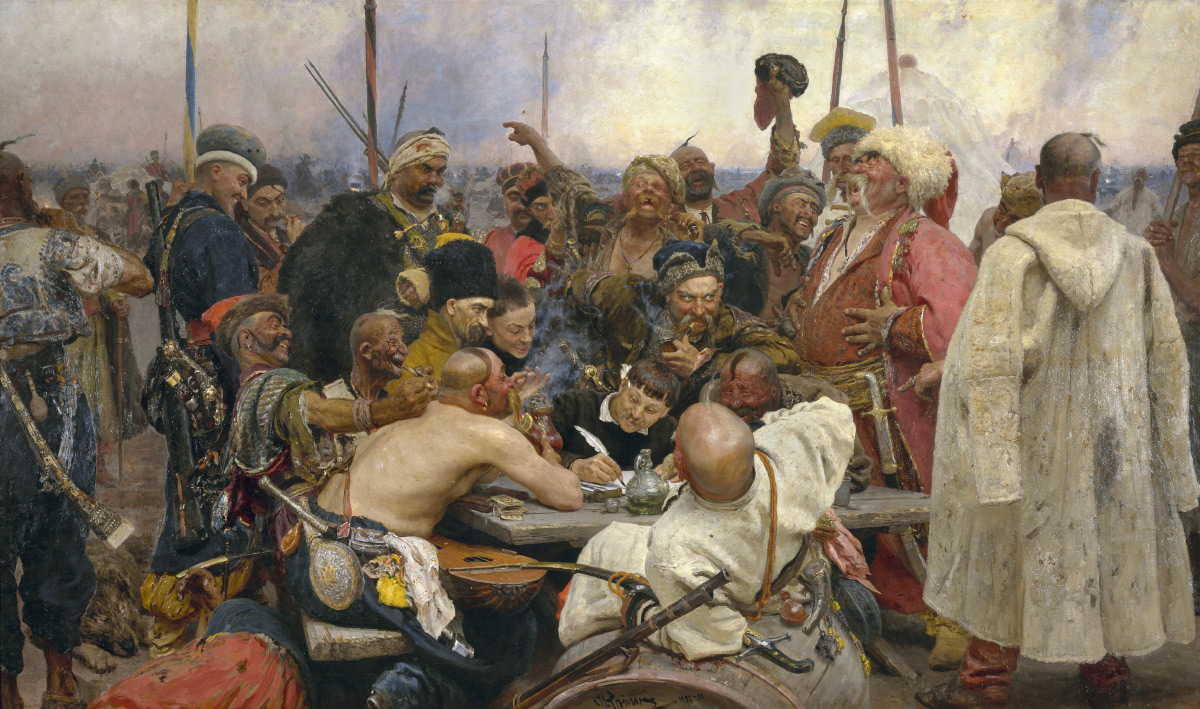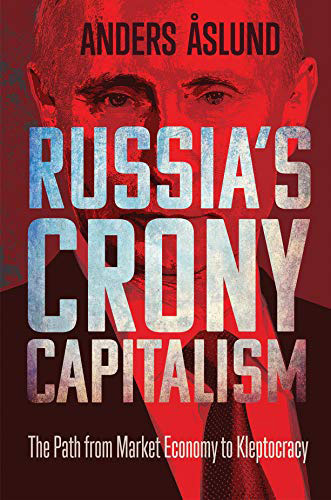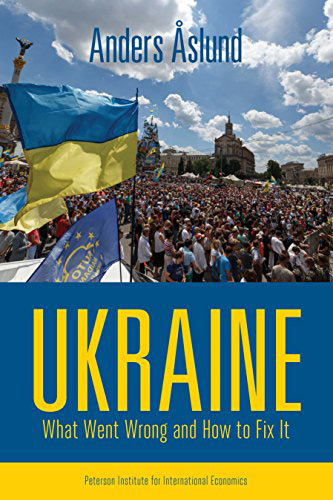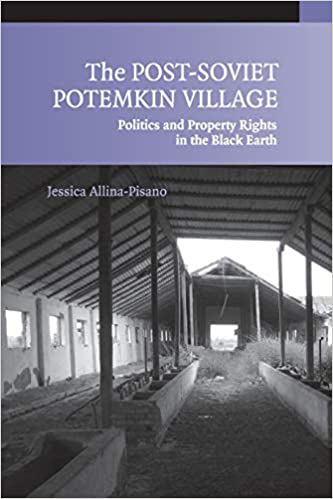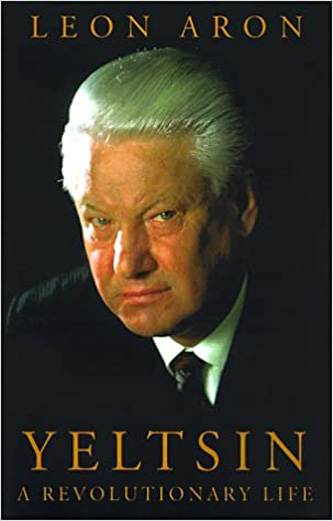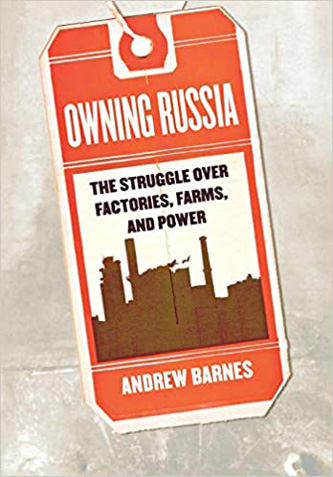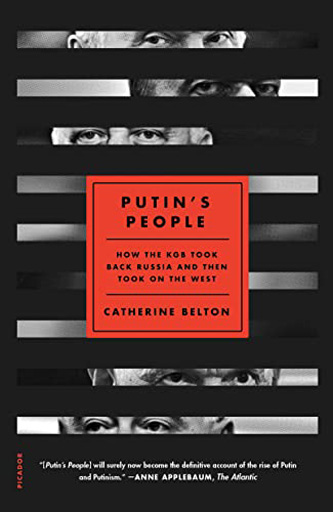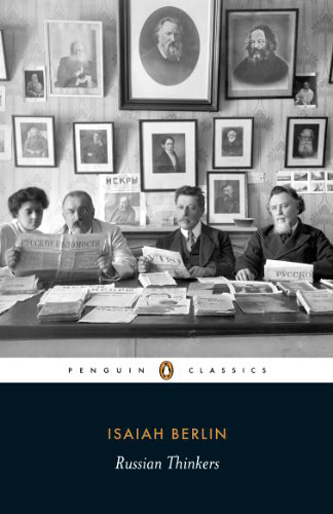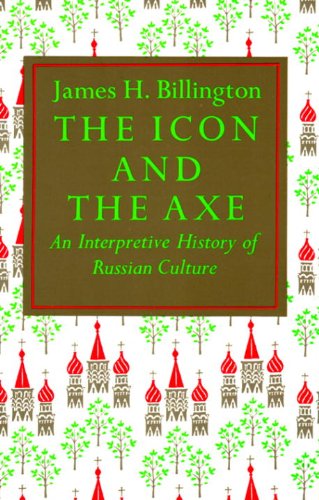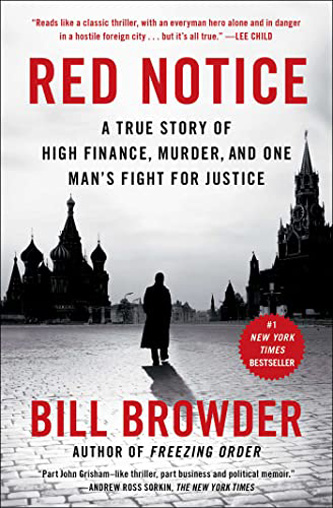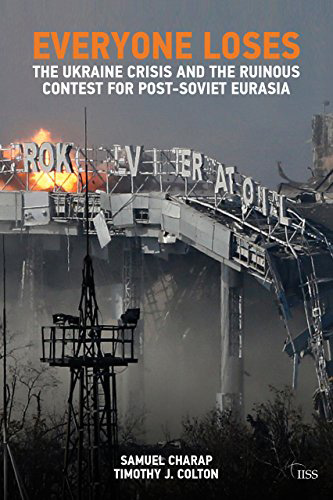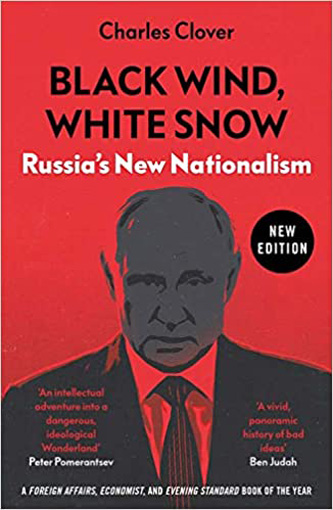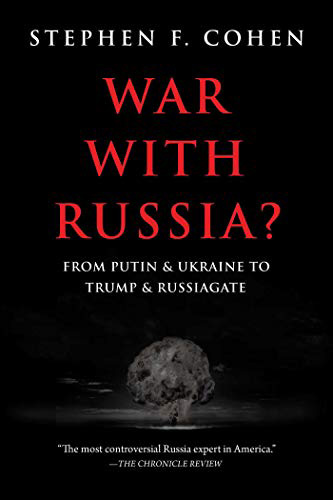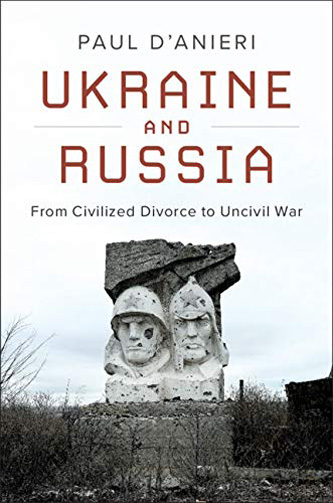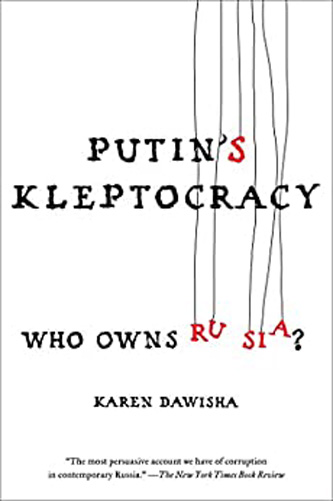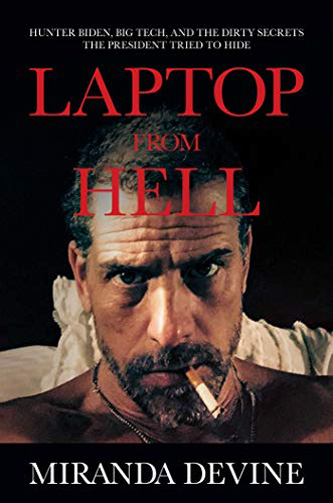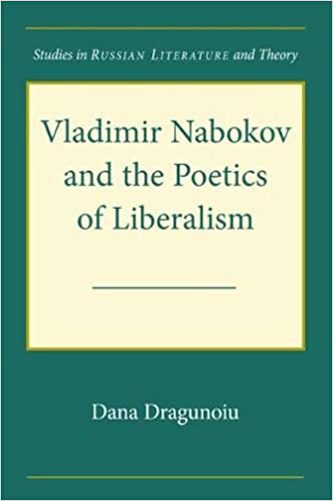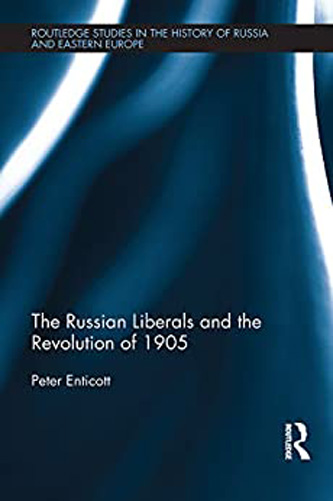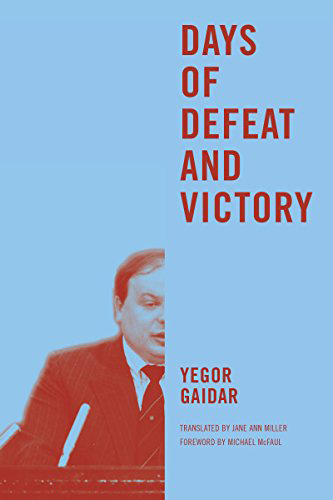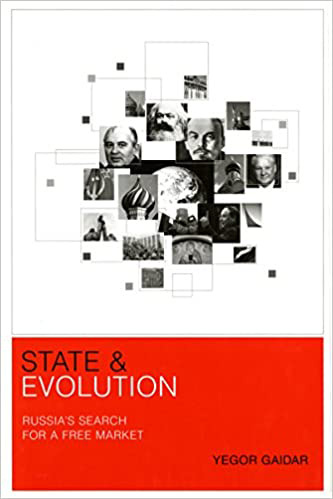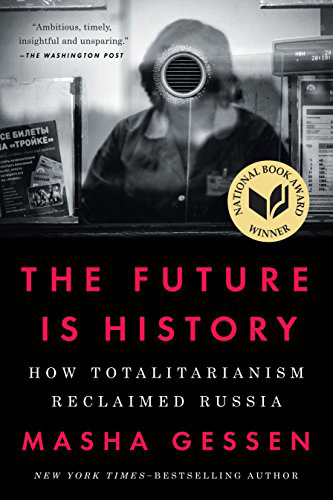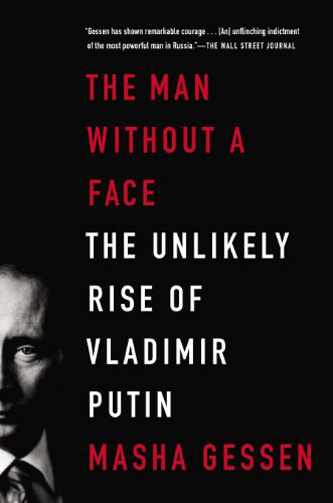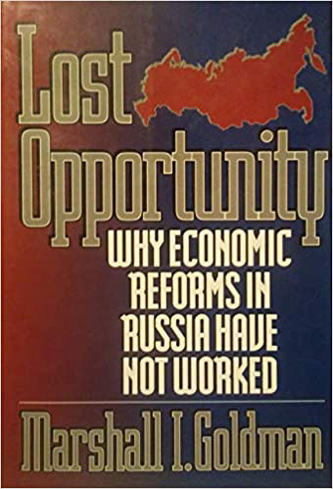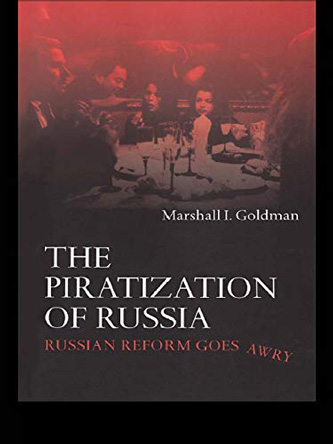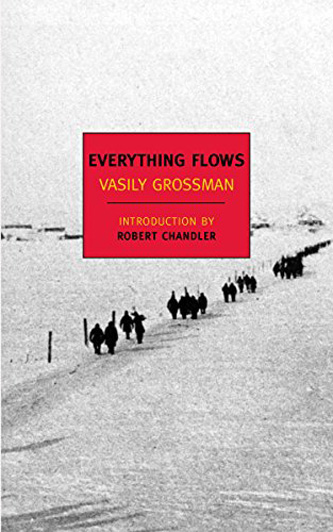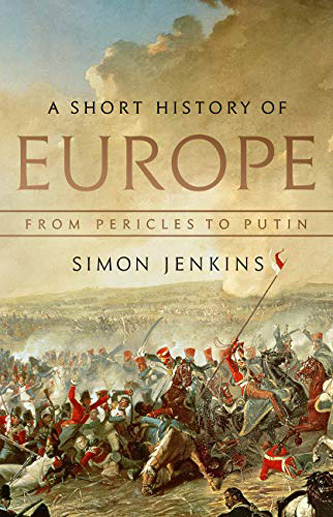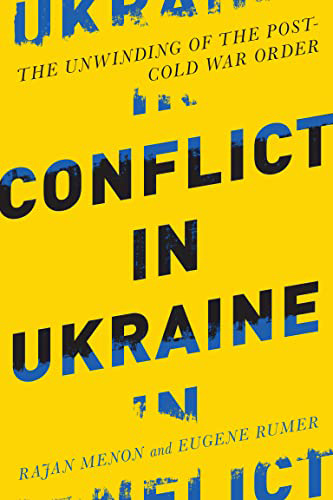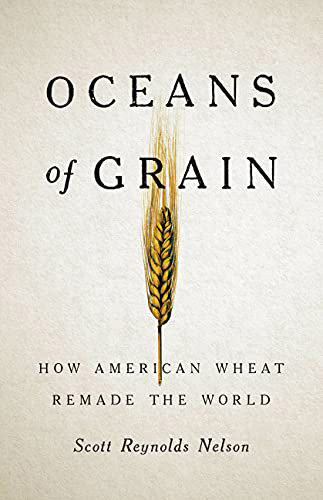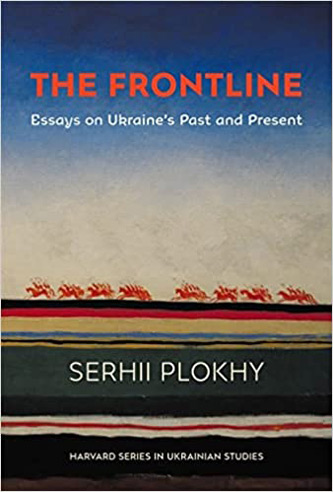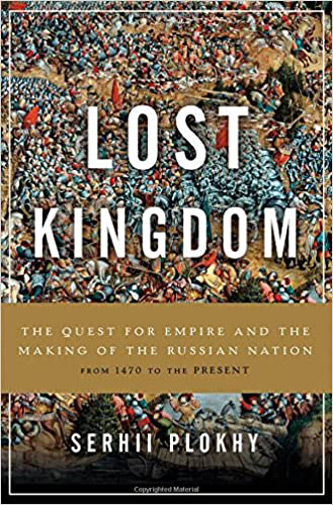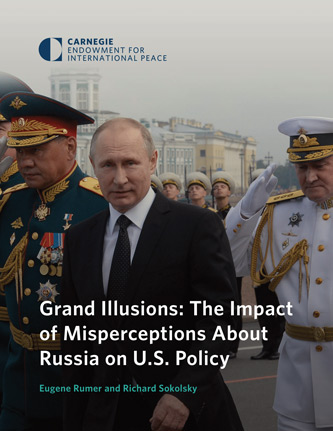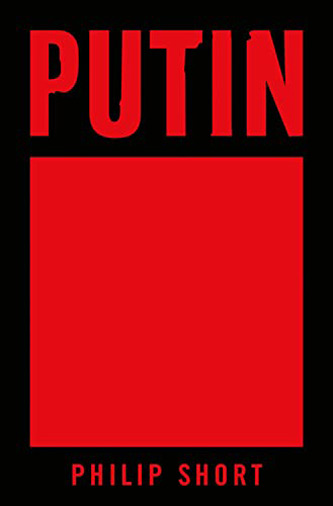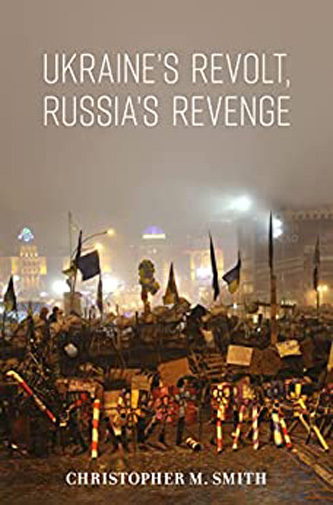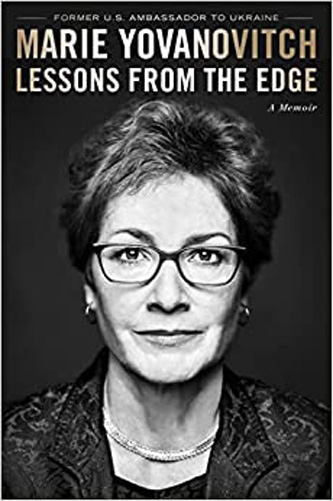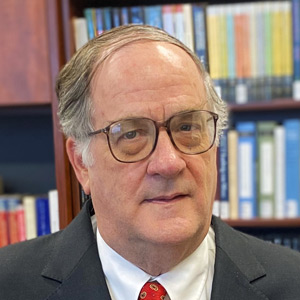The war between Russia and Ukraine is happening on the opposite side of the world and between countries that have different histories and political cultures from our own. Where is there a guide through all this complexity for journalists; policy staff in the U.S. government’s legislative and executive branches; college students at the graduate and undergraduate levels; and civically-minded members of the general public? I’ve sought to provide such a guide in this annotated set of recommended readings.
The books and articles listed in the bibliography do not take a uniform stance, but they do cluster around the themes of geopolitics, liberty, and state power.
The conflict between Russia and Ukraine brings up just-war theory, the past and future of classical liberalism in the region, the difficult issue of nationalities, contrasting political cultures, and a myriad of other issues.
How did the war come to pass? Putin presides over a mafia state. It evolved from the oligarch-dominated state under Yeltsin. The Yeltsin era, though free in many ways, ushered in kleptocracy instead of the normal commercial society that might have followed the fall of Communism. Is the Russian invasion simply an empire-building mafioso Putin on the march?
Ukraine also has had its own dominance of oligarchs. Fortunately, some political freedom and freedom of speech was a by-product of oligarchical rivalry. Putin suppressed and tamed the Yeltsin-era oligarchs—and has since suppressed civil liberties. In contrast, oligarchical rivalry persisted in Ukraine and so did considerable liberty.
How much weight should be given to the geostrategic situation of Russia, vulnerable to invasion across the North European Plain? How important are what political scientists call “security dilemmas,” in which national leaders mistake each other’s intentions? Numerous Russian rulers have sought a buffer on the country’s western front. What weight should be given to NATO expansion? Promises (never put down formally) were made to Russian leaders of “not one inch” of expansion eastward. Encroachment of this sort has historically been seen by Russian decision makers as a strategic threat.
What weight should be placed on widespread Russian beliefs that Ukraine is culturally and linguistically part of Russia? Despite such affinities, Ukrainian attitudes toward Russia have been shaped by such matters as Stalin’s terror-famine of the 1930s and the more recent handling of the disaster at the nuclear power plant in Chernobyl.
Ukrainian political life after Communism has been a seesaw between pro-Western and pro-Russian leaders. But the Russian encouragement of the secession of the Donbas in 2014 removed some of the pro-Russian constituency from the mix. And now Russian speakers in the east are newly hostile to Russia because of the 2022 invasion. Assuming that an independent Ukraine persists, the experience of fighting off the Russians is likely to elevate Ukrainian military figures in the country’s future politics.
What can we make of the difficulties of classical liberalism in this region? In the Enlightenment period, Alexander Radishchev presented natural-rights liberalism for consideration. But in the nineteenth century, Russian liberals turned to positivism and utilitarianism and burdened their program with welfare-state measures. These diminished the clarity and power of the liberal message but could never be enough for the country’s revolutionary socialists and populists. After the Russian Revolution of 1905, classical liberals were a major force. But they were never able to overcome the entrenched autocracy and could not thrive under a sham pseudo-constitutionalism. After tsarist rule collapsed in March 1917, Russian liberals played a major role in the Provisional Government. But their political prospects were doomed by their commitment to fighting on in World War I, their lack of drive on getting feudal land into the hands of peasants, and their concentration on preserving imperial boundaries (rather than addressing with vigor the injuries to oppressed national minorities). This hurt liberal prospects as well during the civil war that followed the Bolshevik takeover.
Is the 2022 Russian invasion of Ukraine a continuation of conflict between Western Europe and Eastern Europe? Is the Russo-Ukrainian clash a clash of civilizations? How influential in Russian ruling circles is the anti-Western ideology of Eurasianism? Ukraine, especially western Ukraine, has been strongly influenced by Poland. Poland in turn has been influenced by Western European culture. Poland has its own history of “Golden Liberty,” which Ukrainians have known of, even when they didn’t fully enjoy it. Russia turned against the West under Ivan the Terrible, and despite efforts to import or copy Western technology, Russia has never embraced Western values and constitutionalism. Russian nationalism is now highly influential in the country, and Putin has adopted it. Nonetheless, we can hope Russia has the potential to become a nonauthoritarian country. Other countries have surprised historians and political scientists in the past.
If you can read only three items, choose Everyone Loses, by Samuel Charap and Timothy J. Colton; Prisoners of Geography, by Tim Marshall; and “Medieval Geopolitics Help Explain Modern Russia and Ukraine,” by Cathy Young.
Everybody Loses, by Charap and Colton, is an excellent realist analysis of the Russia-Ukraine conflict up to 2014. Decision makers in Russia, Ukraine and elsewhere have made zero-sum moves with negative-sum results—hence the major countries involved are worse off.
Marshall’s book, Prisoners of Geography, includes a compact account of geo-strategic aspects of Russo-Ukrainian relations. He points out that the North European Plain (which includes Ukraine) has “repeatedly” been “an encouraging territory from which to attack Russia.” During the past five hundred years, Russia has been fighting “in or around” the North European Plain “once every thirty-five years.”
Young points out in her short article on “Medieval Geopolitics” that the history of Russia and Ukraine shows that going back to the Middle Ages, the political cultures in the two nations have placed different emphases on liberty and state power.
Åslund, Anders, and Michael McFaul, eds. Revolution in Orange: The Origins of Ukraine’s Democratic Breakthrough. Carnegie Endowment for International Peace, 2006.
Particularly recommended are Anders Åslund’s essay on the Ukrainian oligarchs, and the essay by Nikolai Petrov and Andrei Ryabov on Russia’s blundering intervention in the 2004 Ukrainian presidential election.
Here’s a quotation from Åslund: “[Acting Prime Minister Yukhym] Zviahilskiy brought with him a group of state enterprise managers who joined the government to make money on subsidized state credits, state subsidies, and privileged arbitrage between fixed state prices and free-market prices. The coal industry firmly established itself as a rent-seeking machine, living on subsidies.”
Åslund, Anders. Russia’s Crony Capitalism: The Path from Market Economy to Kleptocracy. Yale University Press, 2019.
Åslund writes: “To divine where Russia’s economic policy may be moving, we need to examine the public debate. ... The economists fall into two big ideological camps, classical liberals versus statists and nationalists. A new strand focuses on combating corruption. ... Putin’s official adviser [Sergei] Glaziev ... advocates state capitalism, protectionism, and loose monetary and fiscal policy.”
Åslund, Anders. Ukraine: What Went Wrong and How to Fix It. Peterson Institute for International Economics, 2015.
The author writes: “Ukraine’s fundamental problem is that it did not experience any clear break from the communist system. Its tardy transition to a market economy bred pervasive corruption by giving the old elite ample opportunities to transform their power into personal wealth. They [built] a rent-seeking oligarchy. ...
“A score of big businessmen have captured the state in Ukraine, more than any other postcommunist country. [They let] neither foreigners nor smaller Ukrainian businessmen into [the sectors they dominate]. ... The prominent role of the oligarchs in Ukrainian society has been both good and bad. Competition between the big business groups has kept Ukraine quite an open society, unlike for example Russia, but these groups have also rendered society corrupt and lopsided to their benefit.”
Allina-Pisano, Jessica. The Post-Soviet Potemkin Village. Cambridge University Press, 2007.
How “red directors” blocked land reform in Ukraine. Mark R. Beissinger, of Princeton University, writes, “In this outstanding political ethnography, Jessica Allina-Pisano penetrates beneath the surface of rural life in post-Soviet Russia and Ukraine to show how local officials and farm directors utilized shifting property-rights regimes to assert their control over land. In the process, she brilliantly reveals why social relations in the post-Soviet countryside have come to resemble precisely what reformers had sought to overturn.”
Antelava, Natalia. “The Man Who Remade Georgia.” The New Yorker, November 28, 2014.
Antelava writes: “[Georgia] became a laboratory for [Kakha] Bendukidze’s radical libertarianism. Governments across the former U.S.S.R. watched in disbelief as he not only rapidly privatized state industries but also abolished most of the country’s regulatory agencies. Bendukidze cut income and payroll taxes and abolished other taxes, customs tariffs, and nearly eight hundred government licenses and permits.
“‘Each government permit was a corruption tool that allowed the state to take bribes,’ Fady Asly, the chairman of Georgia’s International Chamber of Commerce, said. ‘Kakha just eradicated that whole system.’ ...
“The result ... was astonishing. By 2005, Georgia’s budget had tripled – largely because taxes, though lower, were being collected – and its G.D.P. was growing by ten per cent each year. By 2009, the country had climbed from a hundred and forty-seventh to eleventh place in the World Bank’s ‘ease of doing business’ index. ...
“With many of his closest allies [in Georgia] in jail or exile, Bendukidze left Georgia for Ukraine, where President Petro Poroshenko asked him to become his economic adviser. ... With the same tough love that he had inflicted on Georgians, Bendukidze urged Ukrainians to stop blaming others for their problems. ‘You have broken every world record in idiocy,’ he told an audience at the Kyiv School of Economics, in July. ‘You keep electing populists, people who promise you more. This means you are electing the worst.’
“[Bendukidze] advocated cutting government spending, reducing retirement benefits for public servants, and radically deregulating the economy. Ukraine, he said, in one of his last interviews, had too many ministries and agencies. ‘Who needs them when the government’s sole function these days is to take money from the International Monetary Fund and pass it on in payment for Russian gas?’ he asked.”
Applebaum, Anne. Red Famine: Stalin’s War on Ukraine. Doubleday, 2017.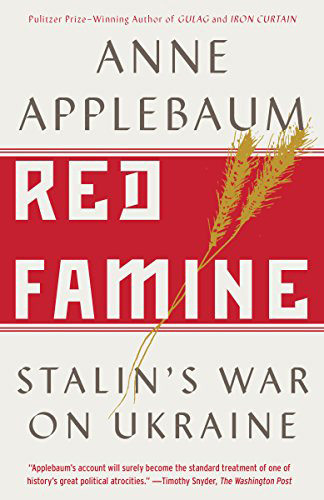
Timothy Snyder writes, “[Applebaum] rightly insists that the deliberate starvation of the Ukrainian peasants was part of a larger [Soviet] policy against the Ukrainian nation . . . To be sure, Russia is not the Soviet Union, and Russians of today can decide whether they wish to accept a Stalinist version of the past. But to have that choice, they need a sense of the history.” The Economist writes as well, "Food supply was not mismanaged by Utopian dreamers. It was weaponised . . . With searing clarity, Red Famine demonstrates the horrific consequences of a campaign to eradicate 'backwardness' when undertaken by a regime in a state of war with its own people." Kirkus reviews says, “Applebaum provides a ‘crucial backstory’ for understanding current relations between Russia and Ukraine.”
Aron, Leon. Roads to the Temple: Truth, Memory, Ideas, and Ideals in the Making of the Russian Revolution, 1987-1991. Yale University Press, 2012.
We’ve all heard that economic stagnation or the pressure of the arms race caused the fall of socialism in the Soviet Union. This book argues instead that moral revulsion caused the fall of socialism. First, much of Communist ruling elite at the top, and then—as things opened up—the rest of society, voiced their revulsion at the moral degradation and assaults on human dignity inherent in actually-existing socialism. Aron writes, “Non-freedom remained as [Vassily] Grossman put it, in the foundation of building started by Lenin, erected by Stalin, and extended by his successors. Its mortifying weight bore down not just on the intelligentsia—the intellectual, the writer, the scholar. Freedom, concludes the hero of Grossman’s [Forever Flowing], is not just freedom of speech, of press, of religion. Freedom was the peasant’s right to sow what he wanted, or any tradesman’s right to make shoes and boots, to bake bread, and to sell to whomever he wanted or not to sell at all. Freedom was the same for the turner or the steelmaker as it was for the artist: live and work as you wish, not as you are ordered.”
If moral revulsion led to the fall of socialism, perhaps it might lead to the fall of Putin’s kleptocratic mafia state.
Aron, Leon. “The Battle over the Draft,” Russian Outlook, American Enterprise Institute, July 28, 2005. Reprinted in Leon Aron, Russia’s Revolution, Essays 1989-2006. Pp. 270-82. The AEI Press, 2007.
When the Soviet Union fell apart in 1991, a two-year military conscription term was in force. Conscription continued in Russia, but the length of required service was reduced to 18 months for persons conscripted in 2007 and to one year beginning in 2008. The draft persists in Russia because it is supported by leftists, nationalists, and the upper ranks of the military.
The author says that “the state [is] determined to preserve the draft, and the society ... fears and detests it.” He writes: “[T]he draft is one of the last vestiges of the formerly omnipotent Soviet state, the epitome of the absolute command over society it wielded with mindless and often self-defeating cruelty. ...
"Throughout the Yeltsin era, the end of the draft and the creation of professional armed forces were among the reformers’ main objectives. ... Unable to collect taxes–and thus impoverished like every revolutionary government before it–and unwilling to take on yet another battle against the ‘patriots’ amidst the endless economic and political crises, the Kremlin [under Yelstin] failed again and again to dispose of the draft.
"Unlike their allies among the nationalists and the leftists, for the Russian officer corps the preservation of the draft is less a matter of highfalutin sloganeering about ‘the glory and the honor of the Motherland’ than a confluence of institutional inertia and, particularly for those in the senior ranks, job security. ...
"On the principle of conscription, the [Putin] government [has remained] unyielding. [Defense Minister Sergei Ivanov] declared that conscription as such will never be completely phased out."
Aron, Leon. Yeltsin: A Revolutionary Life. St. Martin's. Press, 2000.
Aron summarizes his findings in a June 16, 2002 letter to the editor of the Wall Street Journal: “By 1999, ... the tamed inflation, stable ruble, privatization and the elimination of price controls were filling the stores with plenty unimaginable by any living Russian. Once a backward autarky, Russia now had real banks and a stock exchange. The economy grew by almost 6%. ...
“In the 1990s, Russia was the freest it had ever been, save for the seven months between the February 1917 revolution and the Bolshevik takeover in October. In its freedom of speech, press and demonstrations, the country’s civil society was among the most unshackled anywhere.”
This book is fascinating throughout, but classical liberals will be particularly interested in chapter 10 (“The Revolution”), which sets forth the Yeltsin-Gaider economic liberalization program. Anders Åslund called this book when it came out Aron’s “greatest academic work.” Bill Keller said: “Aron sets out to reclaim Yeltsin from the cartoonists and establish his importance as the instrument of a profound transformation of Russia. It is a complex and nuanced portrait, not adoring but unabashedly admiring. ... A fine, full-blooded political portrait.”
Leon has written: “On December 29, [1991,] four days before price controls were to be lifted, Yeltsin addressed the nation in a televised speech, in which he placed the economic revolution at the center of the general ‘decommunization’ of Russia. Along with prices set by the state, ‘we are abandoning mirages and illusions,’ Yeltsin said. It was clear that the Communist utopia ‘could not be built.’”
Barnes, Andrew. Owning Russia: The Struggle over Factories, Farms, and Power. Cornell University Press, 2006.
“Andrew Barnes analyzes the collapse of the USSR and its chaotic aftermath in Russia not as a case of failed transition to democracy and markets, nor as a battle pitting noble, Westernizing ‘reformers’ against recalcitrant ‘conservatives,’ but, above all, as a prolonged ongoing high-stakes’ struggle to control valuable assets,” says Stephen E. Hanson, University of Washington.
Beissinger, Mark R. “Why We Should be Sober About the Long-Term Prospects of Stable Democracy in Ukraine.” Washington Post, March 11, 2014.
Beissinger writes: “Participants [in urban civic revolts like the Orange Revolution] are actually a minority of society, most are motivated more by common disdain for the incumbent regime than by commitment to democratic values, and the democratic master narratives that accompany these revolutions function as a holder for a wide variety of grievances and purposes—some democratic, some not.
“For example, although the Orange Revolution was ostensibly carried out in the name of democracy, less than three months after the revolution ended, only 34 percent of Orange Revolution participants said that they favored a multiparty system for Ukraine, while 38 percent opposed it. ...
“Although the Orange Revolution had been sparked in significant part by abuses of presidential power, Orange revolutionaries and revolution supporters were much less likely to oppose the introduction of direct presidential rule that would limit severely the power of the legislature than were revolution opponents and counter-revolutionaries. And Orange Revolution participants were just as likely to agree with the statement ‘Several strong leaders can do more for the country than laws and discussion’ as were Orange Revolution opponents and counter-revolutionaries, with 61 percent of Orange revolution participants agreeing with this statement. ...
“When the goal of opposition is to mobilize as many citizens as possible against an incumbent regime, revolutionary coalitions tend to be diverse and highly fractious. ... Orange Revolution participants ... consisted of three roughly equal groupings of opinion in terms of policy preferences: anti-market nationalists, socialists and pro-market nationalists.”
Belton, Catherine. Putin’s People: How the KGB Took Back Russia and Then Took On the West. Picador, 2020.
Tony Rennell of The Daily Mail writes, “A book that western experts on modern Russia acknowledge as vital to our understanding of the Putin phenomenon . . . Belton draws on published sources and deep-throat contacts to plot a course through the maze of crooked financial manoeuvres – the sleights of hand, the back-room deals, the ‘loans’ from state banks, the kick-backs on contracts – that Putin and his courtiers got up to as they systematically drew the wealth to themselves as inexorably as iron filings to a magnet.”
Berest, Julia. The Emergence of Russian Liberalism: Alexander Kunitsyn in Context, 1783-1840. Palgrave Macmillan, 2011.
Randall A. Poole writes: “Aleksandr Petrovich Kunitsyn (1783–1840) was one of the founders of [Russia’s classical-liberal] tradition, as [Julia] Berest clearly demonstrates in her excellent intellectual biography. She identifies him as one of the earliest, if not the earliest, Russian theorist of ‘liberal individualism.’ .... He was a principled champion of negative liberty, ‘the right of the individual to act freely within his private domain, the right to choose his occupation, and, ultimately the right to shape his life within the limits set by law and the moral principles embodied in the Kantian categorical imperative. Kunitsyn rightly understood Kant’s concept of dignity as applying to all human beings without regard to their social status or economic situation.’
Kant was one major source of his [classical] liberal philosophy. Another was Adam Smith. ... Kunitsyn [was committed] to individual autonomy, civil rights, and the rule of law; his unqualified acceptance of private property, the free market, and the principle of laissez-faire; and [recognized] that Russian liberalism depended ultimately on the growth of civil society. ...
“[One of Kunitsyn’s admirers was the poet Alexander Pushkin.] His liberalism (as expressed, for example, in his famous 1817 poem ‘Ode: Liberty’) owed much to his teacher. Pushkin commemorated Kunitsyn in his poem ‘19 October’: ‘To Kunitsyn — the tribute of the heart and wine! / He created us, he sparked our fire, / He laid the foundations, / He lit the light/.’ ...
“Kunitsyn’s defense of constitutionalism distinguished between modern liberty, defined as negative liberty or private autonomy guaranteed by civil rights, on the one hand, and ancient liberty or direct participatory democracy, on the other. This distinction, Berest explains, had recently been made by Benjamin Constant. ...
“For Kunitsyn, the purpose of the state was not to order, regulate, and police society in pursuit of a higher, common good (such as in [German philosopher Christian] Wolff), but to defend people’s natural and civil rights through the rule of law and to provide the safety and security necessary for individuals to pursue their own ends. ... Well before it was common for Russian thinkers, he seems to have defended full religious freedom for individuals, maintaining that faith is a matter of personal conviction. Less surprising was his robust defense of individual property rights. ...”
Berlin, Isaiah. “Fathers and Children,” in his Russian Thinkers. Edited by Henry Hardy. 2nd ed. Penguin Books, 2008.
Berlin, an intellectual historian at Oxford, wrote: “Turgenev looked on [A Sportsman’s Sketches] as his first great assault on the hated institution of serfdom, a cry of indignation designed to burn itself into the consciousness of the ruling class. When, in 1879, he was made an Honorary Doctor of Laws by the University of Oxford, ... James Bryce, who presented him, described him as a champion of freedom. This delighted him. ...
“[Turgenev’s] major novels, from the middle Fifties onward, are deeply concerned with the central social and political questions that troubled the [classical] liberals of his generation [in Russia].
“Turgenev ... wanted to understand the new Jacobins [among the nineteenth-century Russian radicals]. .. [T]hese young men were wrong-headed, barbarous, contemptuous of [classical] liberals like himself. ... He was intrigued, horrified and dazzled by them.”
Billington, James H. The Icon and the Axe: An Interpretive History of Russian Culture. Vintage Books, 1970.
The author writes: “Why was constitutional liberalism so late in coming to Russia? Basically, ... Russia remained until the very end of the nineteenth century a relatively backward country still dominated by religious habit and a traditional agricultural economy. The intelligentsia had fused elements of religious utopianism and of aristocratic snobbery into an attitude of contempt for ... constitutional reform and representative government. ...
“The native Russian business class ... seemed generally more anxious to gain government support for their developmental projects than to limit governmental interference. The involvement of Jews, Germans, and Armenians in Russian trade and the growing influx of foreign capital made laissez-faire liberalism seem synonymous with turning Russia over to foreign masters.
“Finally – and in many ways most important – there was an enduring contempt for the bourgeoisie within the intellectual community. Rooted in the traditional distaste of the intelligentsia for meshchanstvo and nourished by aristocratic aestheticism, this prejudice against the bourgeois form of life was confirmed in the late nineteenth century by a tendency to equate the bleak world of Ibsen’s plays with bourgeois society as a whole.”
Biskupski, M. B., and James S. Pula, eds. Polish Democratic Thought from the Renaissance to the Great Emigration: Essays and Documents. Columbia University Press, 1990.
Polish political experience has had an important influence on Ukraine. From the Introduction: “Whatever its flaws, gentry democracy bequeathed to subsequent generations of political speculation deeply ingrained notions of parliamentary participation in public affairs, limitations of executive authority, the rule of law, freedom of speech and conscience, the rights of the individual vis-a-vis the state, and perhaps most profoundly, the essential disposition to believe that the state exists to serve the nation and not the inverse.”
Boettke, Peter J. “The Russian Crisis: Perils and Prospects for Post-Soviet Transition.” American Journal of Economics and Sociology 58, no. 3 (July 1999): 371–84. [Download PDF]
Boettke writes: “What has emerged in Russia [from 1992 to 1998] has not been a move toward the market, but a new variation on the older economic system known as the Soviet-type economy. This is an economic system in which the main function of enterprises is not to compete in the open marketplace for goods and services, but is instead to protect oneself from the marketplace. It is an economic system of innovative strategies at insulation from the rigors of market competition. ... Russia remains perhaps the prime exemplar of a ‘rent-seeking’ economy in the modern world. And, until that basic structural issue in the polity and the economy is addressed, efforts at transformation of the economic system in a direction which will enable the Russian people to live peaceful and prosperous lives will continue to fall short. ...
“The real difficulty with the post-Soviet era in Russia has been that most of the reform package has been inconsistent and provided incentives which are incompatible with the necessary restructuring. Even worse, many of the proposed reforms have not even been implemented. Shock therapy has not failed as much as it has not been tried.
“The signal sent to economic actors continues to be one which suggests that private and public predation of wealth creation is to be expected, and thus, economic actors do what is predictable – escape to the black market, hide assets or move them abroad, engage in only short-term investment. In short, markets are evident for all to see in a way they weren’t during the Soviet period, but the view of markets is one of kiosks and bazaar style street trading, combined with crony-capitalist style small-scale production, and crony-socialist style large-scale production.”
Boettke, Peter J. Why Perestroika Failed: The Politics and Economics of Socialist Transformation. Routledge, 2015.
Most of Boettke’s book is devoted to his excellent argument as to why Gorbachev’s reform communism didn’t succeed and could not have. Here are some of Boettke’s propositions: “Socialism as originally conceived was (is) an economic impossibility,” and “mature Soviet-style socialism, since it could not have conformed to the textbook model of socialism, is best understood as a rent-seeking society [a mercantilist society] with the main goal of yielding perquisites to those in positions of power.” At the end of the book are valuable sections on “establishing a liberal regime in the former communist economy,” “the logic of shock therapy,” and “is democracy necessary?”
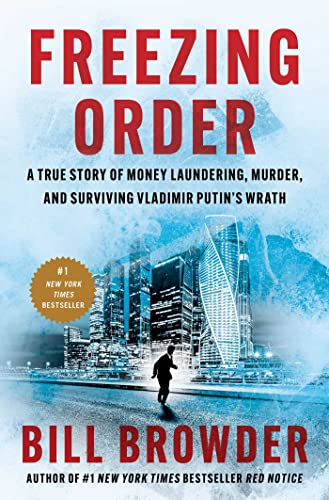 Browder, Bill. Freezing Order A True Story of Money Laundering, Murder, and Surviving Vladimir Putin’s Wrath. Simon & Schuster, 2022.
Browder, Bill. Freezing Order A True Story of Money Laundering, Murder, and Surviving Vladimir Putin’s Wrath. Simon & Schuster, 2022.
From the review in the London Telegraph: “Reading Bill Browder’s zesty new book about the theft, extortion, intimidation, lies and murder that are the Russian state’s daily levers of power can feel like reading several books at once. One, a breakneck financial thriller compelling breathless attention; another, a true story, crisply told, of a country’s looting on a gigantic scale; a third, a morality tale of how liars first have to carry on lying, then simply abolish the truth; and fourth, and not least, a stimulating essay on Vladimir Putin’s motivation that sheds light on his monstrous war in Ukraine.” Browder is the grandson of Earl Browder, the leader of the Communist Party USA from 1930 to 1946.
Browder, Bill. Red Notice: A True Story of High Finance, Murder, and One Man’s Fight for Justice. Simon & Schuster, 2015.
Book Authority named this book one of the “Best Political Corruption Books of All Time.” Playwright Tom Stoppard writes: “The story of Sergei Magnitsky’s life and death is a shocking true-life thriller, and Bill Browder was the man to write it.”
From the publisher: “Bill Browder started out his adult life as the Wall Street maverick whose instincts led him to Russia just after the breakup of the Soviet Union, where he made his fortune.
Along the way he exposed corruption, and when he did, he barely escaped with his life. His Russian lawyer Sergei Magnitsky wasn’t so lucky: he ended up in jail, where he was tortured to death. ... [Browder] saw the murderous heart of the Putin regime and has spent the last half decade on a campaign to expose it. ... A financial caper, a crime thriller, and a political crusade, Red Notice is the story of one man taking on overpowering odds to change the world.”
Buena de Mesquita, Bruce. and Alastair Smith. “Ukraine Fighting Russian Goliath: Why Dictators Are So Bad at War.” The Hill, March 29, 2022.
The authors write: “An important difference between governments as they become more democratic or more autocratic is the extent to which military budgets promote national security or, instead, provide opportunities for corruption and kleptocracy. In democracies, where essential backers make up a large portion of the adult population, it isn’t possible to rule through bribery and corruption. Good policy is needed. In autocracies, where leaders need far fewer supporters, corruption is the currency of political success. ...
“The political incentives dictate that Ukraine fights harder than Russia. In the relatively democratic Ukraine, President Volodymyr Zelensky needs support from many people, each of whom can only expect small privileges. If Ukraine loses, then Zelensky is deposed and his relatively numerous backers lose the few privileges and perks they get. Better for them to give up some of their perks now in order to increase Ukraine’s chance of victory. ...
“Putin spends a lot on Russia’s military. What is he buying with all of that money? Russia’s military budget is a great place to hide true expenditures. Money is readily (mis)directed to enrich loyal generals and defense contractors instead of training and equipping soldiers to be effective in battle. That is why the tires fail on Russian rocket launchers, tanks run out of fuel and commanders have no ability to communicate in secret. A democratic leader’s military spending must emphasize defense if he or she is to survive politically. ...
“Ukraine’s military budget goes to good training, planning and armaments and, as we have seen, that is much less true in Russia. Good fighting abilities go hand-in-hand with democracy, not because their soldiers are inherently superior but because their government leaders suffer electorally if many soldiers are killed. Autocrats, like Putin, stay in office not because they are popular with the masses but because they are popular with their few essential cronies.”
Bunyk, Mykola, and Leonid Krasnozhon. “Liberalism in Ukraine.” Econ Journal Watch 15, no. 1 (January 2018): 83–104. [Download PDF]
Abstract: Among the ex-Soviet nations, Ukraine has been one of the least successful in finding its way to a stable political order and a liberal market economy. Putting the country, its political conditions, and its culture into historical context, we tell of liberal ideas and scholarship as they existed in the pre-Soviet period (treating Mykhaylo Drahomanov, Ivan Franko, Bohdan Kistyakivsky, and Mykhaylo Tugan-Baranovsky), during the Soviet period, during the 1990s transition (treating Oleksandr Paskhaver, Viktor Pynzenyk, and Volodymyr Lanovyi), and as they exist nowadays in higher education, among public intellectuals, and in think tanks and other organizations within Ukraine.
Caldwell, Christopher. “Why Are We in Ukraine?” Claremont Review of Books 22, no. 3 (Summer 2022): 10-15.
The author writes: By [the time protests broke out in 2013 in Kiev’s main square, the Maidan,] the U.S. had spent $5 billion to influence Ukraine’s politics, according to a 2013 speech by State Department official Victoria Nuland. ... Meddling with vital Russian interests at Russia’s doorstep turned out to be more dangerous than orating about democracy. Rather than see the Russophone and pro-Russian region of Crimea transformed from a Russian naval stronghold into an American one, Russia invaded it. ...
The [February 2015] Minsk accords, signed by Russia and Ukraine, were meant to guarantee a measure of linguistic and political autonomy in the culturally Russian Donbass. (Russia claims the violation of these accords as a casus belli.) ...
[On November 10, 2021], [U.S. Secretary of State Antony] Blinken signed a ‘strategic partnership’ that not only reasserted the Bush Administration’s commitment to admit Ukraine into NATO, but also reopened contested sovereignty questions, including that of strategically vital, culturally Russian Crimea. ...
“[T]he worst thing about [the] psycho-moral approach to Russian-Ukrainian affairs is that it produces bad foreign-policy thinking. It implies that, once you account for Putin’s personality, the war is actually about nothing—at least nothing political. And if the war is about nothing, then there is no need to consider what brought it about or where it might be going.”
Carpenter, Ted Galen. “Four Western Provocations That Led to U.S.-Russia Crisis Today.” Responsible Statecraft blog, December 28, 2021.
The author writes: “It is unfair to judge Russia’s aggressive and destabilizing actions, including the annexation of Crimea, the ongoing military intervention in Syria, continuing support for separatists in eastern Ukraine, and attempted interference in the political affairs of other countries, without acknowledging the multitude of preceding Western abuses.”
Carpenter, Ted Galen. “NATO Security Dependents Are Not Useful Allies.” The National Interest, January 8, 2022.
Carpenter wrote before the February 2022 Russian invasion of Ukraine: “Officials in both the Trump and Biden administrations have treated Kiev as a de facto NATO member and a crucial U.S. military ally. Trump’s administration approved multiple weapons shipments to Kiev. ... Such transactions have continued since Joe Biden entered the White House.
“Worse, Washington’s security relationship with Kiev goes far beyond arms sales. Over the past five years, U.S. forces have conducted multiple joint exercises (war games) with Ukrainian units. Washington also has successfully pressed NATO to include Ukraine in the alliance’s war games. Indeed, Ukraine hosted and led the latest version, Rapid Trident 21. It is no secret that such exercises are directed against Russia.”
Carpenter, Ted Galen. “Whitewashing Ukraine's Corruption.” American Conservative, April 6, 2022.
Carpenter writes: “Ukraine has long been one of the more corrupt countries in the international system. In its annual report published in January 2022, Transparency International ranked Ukraine 123rd of the 180 countries it examined, with a score of 32 on a one to 100 point scale. By comparison, notoriously corrupt Russia ranked just modestly lower, 139th, with a score of 29.
“Ukraine’s track record of protecting democracy and civil liberties is not much better than its performance on corruption. In Freedom House's 2022 report, Ukraine is listed in the ‘partly free’ category, with a score of 61 out of a possible 100. Other countries in that category include such bastions of liberal democracy as Rodrigo Duterte’s Philippines (55), Serbia (62), Hungary (59), and Singapore (47). Interestingly, Hungary—which has been a target of vitriolic criticism among progressives in the West because of Prime Minister Viktor Orban’s conservative social policy—ranks eight points higher than Ukraine. ...
“Even before the war erupted, there were ugly examples of authoritarianism in Ukraine’s political governance. Just months after the 2014 Maidan revolution, there were efforts to smother domestic critics, which accelerated as years passed. Ukrainian officials also harassed political dissidents, adopted censorship measures, and barred foreign journalists whom they regarded as critics of the Ukrainian government and its policies. Such offensive actions were criticized by Amnesty International, Human Rights Watch, the Organization for Security and Cooperation in Europe, and other independent observers. ... Indeed, some repressive measures deepened under Zelensky even before the outbreak of war with Russia. In February 2021, the Ukrainian government closed several (mostly, but not entirely pro-Russia) independent media outlets. They did so on the basis of utterly vague, open-ended standards. Zelensky has now used the war as a justification for outlawing 11 opposition parties and nationalizing several media outlets. Those are hardly appropriate measures in a [liberal] democracy, even in wartime.
“It is entirely appropriate to sympathize with Ukrainians who are experiencing terrible suffering as a result of Vladimir Putin’s decision to launch a war. Whatever the level of provocations from the United States and its NATO allies, and Ukraine’s willingness to collaborate in those provocations, Russia’s response was over-the-top. It created a dangerous breach of the peace in Europe and a humanitarian catastrophe. However, one can condemn Putin’s actions and even cheer on Ukraine’s military resistance without fostering a false image of Ukraine’s political system. The country is not a symbol of freedom and liberal democracy, and the war is not an existential struggle between democracy and authoritarianism. At best, Ukraine is a corrupt, quasi-democratic entity with troubling repressive policies.”
Charap, Samuel, and Timothy J. Colton. Everyone Loses: The Ukraine Crisis and the Ruinous Contest for Post-Soviet Eurasia. Routledge, 2016.
This book is a realist analysis of the Russia-Ukraine conflict. Charnap and Colton argue that leading up to the 2014 Ukraine crisis, decision makers in Russia, Ukraine and elsewhere have made zero-sum moves with negative-sum results – hence the major countries involved are worse off. The authors cover geopolitical strategy, mercantilist economic policies, Russia’s desire for a sphere of influence, and the U.S. and European Union’s promotion of their preferred political norms (often called “democracy promotion”). The authors concentrate on Russia-Ukraine relations but also refer to other countries formerly part of the Soviet Union or former Soviet satellites. The authors are quite fair-minded and find plenty of moves by all countries that were based on misperceptions or that proved counterproductive.
“Historically informed and analytically penetrating, this account of the crisis in Ukraine and other ‘in-between’ areas should be at the top of the reading lists for scholars, policymakers and members of the interested public. What is revealed could be called a comedy of errors if the results were not so tragic. And if leaders in Russia and the West are to cope with the conflict they have created, they should start by reading this study,” writes Robert Jervis, professor of international politics at Columbia University.
Clover, Charles. Black Wind, White Snow: The Rise of Russia’s New Nationalism. Yale University Press, 2016.
Rose Deller writes, “In Black Wind, White Snow: The Rise of Russia’s New Nationalism, Charles Clover traces an intellectual history of ‘Eurasianism’, a theory of Russian national identity based on the idea of a primordial Eurasian civilisation, as a means of understanding contemporary Russian politics. ...
“Clover argues that this new vocabulary signals the growing influence of ‘Eurasianism’, a form of Russian supra-nationalism based on the idea of a primordial Eurasian civilisation successively incarnated as the Scythians, Huns, Turks, Mongols, the Russian Empire and, most recently, the Soviet Union; a civilisation destined to be locked in a permanent geopolitical conflict with the ‘Atlantic’ world centred on the United States. Disentangling Eurasianist ideas and their influence on the Russian elite can help to explain some otherwise puzzling aspects of the Kremlin’s recent behaviour, according to Clover. For example, what sort of strategic calculus made it seem imperative to gain a toehold in eastern Ukraine in 2014, despite the inevitability of Western sanctions and the massive decline in the value of the rouble?”
Codevilla, Angelo M. “Cracking Putin’s Code.” Law & Liberty, March 9, 2014.
Codevilla writes: “[T]here is no doubt at all about [Putin’s] long term objective: to recapture trouble-making power over Ukraine, to use that trouble-making power to restore Ukraine as the crown jewel of the Russian Empire, then to squeeze the rest of the former Soviet empire back into Moscow’s fold, and then to overawe Europe. ...
“Putin [is not] trying to unite the eastern Ukraine to Russia, because doing so would preclude achieving his long-term objective of taking back all of that country politically. The departure of the East would leave a people composed almost exclusively of Ukrainian-speaking Catholics, unshakably oriented to the West, united, wholly foreign to Russia. In such a country, Russia would have no levers to pull.
“After all, it was precisely to forestall the emergence of such a unit within the Soviet Union that Stalin originally drew Ukraine’s borders to include lots of Russians. Putin, more aware of what Stalin was after than some American enthusiasts of Ukraine’s ‘territorial integrity’ seem to be, is not about to rid Ukraine of Russians whom he regards as valuable levers. In short, Putin’s strategy to re-absorb the whole of Ukraine is political. Keeping the eastern Ukraine‘s millions of Russians within the country’s borders is essential to that strategy.
“Ukrainians serious about their independence might weigh insuring it by surrendering the Russian-ethnic majority eastern territory to Russia. Stability and unambiguous political orientation were indeed the result when the former Czechoslovakia divided itself.”
Cohen, Stephen F. War with Russia? From Putin and Ukraine to Trump and Russiagate. Hot Books, 2019.
This book is based on Cohen’s radio broadcasts on the John Batchelor Show and his regular column for The Nation magazine, so it is quite readable, though a bit repetitive. The theme of Cohen’s book is that we are in a new U.S.-Russia Cold War and that this cold war is more dangerous than its predecessor. Why? Because in the first Cold War national leaders were alert to the dangers of escalation to nuclear exchanges, and that in the current confrontation they are less sensitive to such dangers. Cohen is skeptical about Ukraine’s Maidan revolution, stressing continuity with previous corruption in Ukraine. He criticizes the outlawry of pro-Yanukovych political parties. He contends that Kiev did not live up to its obligations under the Minsk II peace agreement to grant substantial autonomy to the Donbas region. Cohen devotes considerable space to how the false allegations of Trump-Russia collusion fit into the U.S. national security elite’s attitude toward Russia.
Conquest, Robert. The Harvest of Sorrow: Soviet Collectivization and the Terror-Famine. Oxford University Press, 1987.
An account of Stalin’s deliberate policy of massive famine in the Ukraine. The author writes: “[In 1932-33], the Ukraine and the Ukrainian, Cossack, and other areas to its east – a great stretch of territory with some forty million inhabitants – was like one vast Belsen. A quarter of the rural population, men, women and children, lay dead or dying, the rest in various stages of debilitation with no strength to bury their families or neighbors. At the same time, (as at Belsen), well-fed squads of police or party officials supervised the victims.
“This was the climax of the ‘revolution from above’, as Stalin put it, in which he and his associates crushed two elements seen as irremediably hostile to the regime: the peasantry of the USSR as a whole, and the Ukrainian nation. ...
“Deception was the crux of every move. ... [I]n the dekulakization, [Stalin] pretended that there really was a ‘class’ of rich peasants whom the poorer peasants spontaneously ejected from their homes; in the collectivization, his public line was that it was a voluntary movement, and that any use of force was a deplorable aberration; and when it came to the terror-famine of 1932-3, he simply denied that it existed.”
D’Anieri, Paul. Ukraine and Russia: From Civilized Divorce to Uncivil War. Cambridge University Press, 2019.
This is largely a “realist school” account of the Russo-Ukrainian conflict. The author adopts the more pessimistic variant of realism, which sees the international system as “bringing even nonaggressive states into conflict,” because states whose leaders seek only “security” can act in ways that nonetheless are perceived by others as posing security threats.
D’Anieri writes: “Even if one concludes that Russia was at fault for the final decision to go to war [in 2014], it is important to recognize that it perceived security challenges that caused considerable concern. One does not need to see Russia’s desire to control Ukraine as a ‘legitimate interest,’ as some authors do, to acknowledge that Russia considered the incorporation of Ukraine into the European Union as a loss. Similarly, even if one considers NATO enlargement to have been a mistake, it was a response to a security problem that did not have another easy solution.”
Davies, Norman. “The Third of May, 1791.” In Constitution and Reform in Eighteenth-Century Poland: The Constitution of 3 May 1791, 1–12. Edited by Samuel Fiszman. Indiana University Press, 1997.
Ukrainian political culture today has been strongly influenced by historic Polish political culture. The author writes that the noble citizens of Poland-Lithuania “enjoyed far-reaching liberties which included the principle of Unanimity and the Right of Resistance. The former invalidated any law that was not guaranteed by all. The latter laid down that any ruler who broke the laws could be legally opposed.
“The fundamental privileges of the nobles, their Magna Charta, dated from 1374, their freedom from arrest, their Habeas Corpus, from 1425. Their statute from 1454 conceded that no new tax would be levied, and no new army raised without the consent of the dietines. Their constitution of Nihil Novi dated from 1505 ruled that no new laws could be introduced without the consent of both chambers of the Parliament. ...
“At a time when most countries in Europe were intent on creating a modern, centralized and bureaucratic state, Poland-Lithuania persisted in maintaining its traditions of local and communal autonomy. At a time when most of Europe was racked by murderous religious wars, Poland-Lithuania succeeded in practicing a far-reaching, though by no means perfect degree of religious toleration.”
The author makes clear that Poland-Lithuania did not allow in Ukraine the liberties enjoyed in the rest of the country. In Ukraine, the Orthodox Church and Uniate Greek Catholic Church were not allowed the status of Roman Catholicism. The Dnieper Cossacks were not allowed the autonomy they wanted.
Davies, Norman. God’s Playground: A History of Poland, 2 vols. Columbia University Press, 1982.
“Ukrainian political culture today has been profoundly influenced by historic Polish political culture. Davies writes: “Throughout the modern period, the history of most European states is dominated by the growth of the state. ... In this context, the workings of one of the very few states in which strong traditions consistently opposed the pretensions of central government may prove instructive. ... Its laws and practices were inspired by deeply rooted beliefs in individual freedom and civil liberty which, for the period, were exceptional. ...
“The assumptions which governed constitutional life in the Republic were mirrored in the realm of public law. In Polish eyes, the law, like the constitution, was too precious a commodity to be left in the hands of the executive authorities. ... Hence the law was not to be enforced by the state. Justice was to be exacted by those whose wrong had been recognized in the courts, ... but never by the magistrates, or by royal officials. ...
“To this way of thinking, those countries which appointed law-enforcement officers responsible to the state, were trading the minor advantage of smooth legal administration, in exchange for a permanent threat to the liberty of their citizens. For this reason, in Poland-Lithuania, there never was any Star Chamber, there was no Oprichnina on the Muscovite model, and no one who might have introduced it. ...
“[T]he Rzeczpospolita of Poland-Lithuania ... was far more republican in structure and spirit than the constitutional monarchies of England or Sweden, and diametrically opposed to the absolutist systems of France, Spain, or Russia. ... [T]he ideals of the Polish nobility possess an air of striking modernity. In an age when most Europeans were lauding the benefits of Monarchism, Absolutism, or of state power, the noble citizens of Poland-Lithuania were praising their ‘Golden Freedom’, the right of resistance, the social contract, the liberty of the individual, the principal of government by consent, the value of self-reliance. ... The coincidence of view between the Polish nobleman of the seventeenth or eighteenth century with the liberal democrat of the nineteenth and twentieth centuries, is not purely fortuitous. It is caused by their common concern to combat the power of the state.”
Dawisha, Karen. Putin’s Kleptocracy: Who Owns Russia? Simon & Schuster, 2015.
Rajan Menon writes, “In explaining the system’s workings, Dawisha enumerates the standard shenanigans of crooked regimes: bribe taking from domestic and foreign companies seeking business permits; kickbacks from inflated no-bid contracts for state projects; privatization deals rigged to enrich cronies who will later be cash cows for the Kremlin; illicit exports of raw materials purchased at state-subsidized prices and sold for a killing; ‘donations’ from oligarchs eager to keep feeding at the government’s trough; real estate scams yielding mega-profits and palatial homes; money laundering; election-fixing; labyrinthine offshore accounts; lucrative partnerships with the mob; and the intimidation, even elimination, of would-be whistle-blowers.”
Devine, Miranda. Laptop from Hell: Hunter Biden, Big Tech, and the Dirty Secrets the President Tried to Hide. Post Hill Press, 2021.
Most relevant for our purposes is chapter 11, “Burisma.” Joe Biden’s son Hunter earned $4 million for his service on the board of Burisma, a Ukrainian energy company. At the time, Joe Biden was vice president of the United States and had Ukraine as part of his portfolio. Joe Biden and then Deputy Secretary of State Tony Blinken successfully used the threat of withholding U.S. loan guarantees to pressure the Ukrainian government. They wanted the government to fire its solicitor general, who was, Devine maintains, “aggressively investigating Burisma.” The author continues: “Hunter liked to say that Burisma was in the noble business of helping Ukraine gain energy independence from Russia. Yet all the people who introduced him to Burisma were aligned with Russia, and Burisma’s owner, [Mykola] Zlochevsky, was the former ecology minister under the Russia-aligned President [Viktor] Yanukovych, who fled to exile in Moscow.”
Dragunoiu, Dana. Vladimir Nabokov and the Poetics of Liberalism. Northwestern University Press, 2011.
Stanislav Shvabrin writes: “Dragunoiu [revisits] the bleak landscape of a once vibrant, yet violently smothered school of thought. ... [S]he presents a compellingly detained survey of the philosophical underpinnings of Russian pre-revolutionary and émigré [classical] liberalism as it would have been known to [the novelist Vladimir Nabokov, whose father was a leading classical-liberal political and legal figure in pre-Communist Russia].
Dunlop, John B. The Faces of Contemporary Russian Nationalism. Princeton University Press, 1983. [Link to Chapter 11]
A portrait of nationalist ideology in Russia during the last days of Communism. Of particular interest is chapter 11, “Theoretical Considerations and Policy Recommendations,” which includes debates about and reaction to the writings of Alexander Yanov. Peter J. S. Duncan says that Dunlop’s writings are among “the most important secondary sources on Russian nationalism under Brezhnev.”
Dunlop, John B. The Moscow Bombings of September 1999: Examinations of Russian Terrorist Attacks at the Onset of Vladimir Putin’s Rule. Ibidem Press, 2014.
Amy Knight writes: “[Dunlop] draws on investigative reporting by Russian journalists, accounts of Russian officials in law enforcement agencies, eyewitness testimony, and the analyses of Western journalists and academics. The evidence he provides makes an overwhelming case that Russian authorities were complicit in these horrific attacks.”
Ebeling, Richard M. “Ludwig von Mises’s Idea on Self-Determination Might Have Saved Ukraine.” FFF Daily blog (Future of Freedom Foundation), April 25, 2022.
Ebeling writes: “[T]here were a good number of Russian-speaking people in [certain] areas of Ukraine who felt more culturally connected with neighboring Russia, and who would have even preferred to be Russian citizens, if they had had the opportunity to express their political preference. But the Ukrainians were adamant that no changes would be permitted in the internationally recognized boundary lines between Ukraine and its neighbors, including, most certainly, Russia. ...
“The [better] answer would have been to follow the advice on this matter of the Austrian economist, Ludwig von Mises, as outlined in his 1927 book on Liberalism. ... Mises explained that the borders established between [new post-World War I] countries left large minorities speaking languages or sharing traditions, customs, and cultures different from the majorities in these new nation-states. The national majorities often attempted to suppress and certainly frequently discriminate against the minority groups within their countries. Government schooling, and government regulations and restrictions over market activities were used to benefit the majority groups at the cultural and economic expense of the minorities. ...
“[Mises] proposed that within villages, towns, and regions of such countries, local plebiscites should be held with the residents of these areas having the right to vote on whether to remain within the country to which they currently belonged, transfer the political jurisdiction over their area to a neighboring country to which they preferred to have citizenship, or become their own nation-state. ...
“For instance, in the Crimea, there is a majority of Russian speakers, and minorities of Ukrainian and Tatar speakers. This type of district and town plebiscites would likely have created a sort of checkerboard of areas, with probably the larger part choosing to be part of Russia, some still part of Ukraine, and still others now making up, possibly, an independent Tatar republic. The remaining task would be to foster an environment of freedom of trade and freedom of movement between such political jurisdictions, so all residents on the Crimean Peninsula could benefit from the greatest degree of economic liberty and freedom of voluntary association for mutual gain.
“The entire situation in the Donbass region of eastern Ukraine would have been dampened or diffused if the Ukrainian government had repealed the Ukrainian language requirements on education, the media, and in any other forms of social and market interactions. The next step would have been to hold plebiscites ... where the largest concentration of majority Russian-speaking areas are located.
“Where would be the rationale and justification for Russian political and military intervention, if such free, local elections demonstrated and determined the preferences of the residents, themselves, concerning to which nation-state they were to belong? And, especially, if changes in political boundaries reflected the voting outcomes.”
Enticott, Peter. The Russian Liberals and the Revolution of 1905. Routledge, 2016.
From the publisher’s promotional material: “There is a widespread notion that Russia is forever fated to be an authoritarian country where liberalism and democracy can never make real progress. However, at the beginning of the twentieth century there was an extremely influential ‘liberationist’ movement which culminated in the formation of a modern, Western-style liberal party, the Constitutional Democrats or ‘Kadets.’ The book provides a comprehensive history of the rise of the Kadets, focusing, in particular, on the revolutionary years 1905–6. ... [T]he Kadets offered a moderate alternative to reaction on the one hand and revolution on the other.”
Enticott writes: “The [Kadet] programme, adopted by the [October 1905 party] congress, unequivocally demanded all the classic Western political and civil rights, such as freedom of speech, religion, movement and assembly.” It demanded separation of powers (between the judiciary and the executive), equality before the law, and no special courts.
Enticott writes further: “The Kadets were not a party of laissez-faire liberalism. Indeed, their radical social and economic programme presupposed a powerful redistributionist and interventionist state.” Their programme was vague and equivocal about the fate of feudal estates. Enticott writes: “The party could not really afford to be neutral in such a vital matter – methods of land tenure were a fundamental problem in the solution of the agrarian crisis.”
Fedirko, Taras. “The Military Roots of Modern Ukraine.” Wall Street Journal, May 26, 2022.
The author writes: “The Russian invasion will shape the Ukrainian state and politics in [various] ways. ... If the country withstands this conflict, it will remain militarized in anticipation of future aggression from its hostile neighbor. Eight years of war have increased the preparedness and prestige of the armed forces, making the army one of the country’s most trusted social institutions. A new generation of mid-ranking officers has emerged, along with publicly recognizable leaders of volunteer militias: These figures may eventually seek to turn their rank and renown into political credentials. And the military itself risks becoming politicized, as there are now army units and militias affiliated with particular parties and movements, mainly on the right.
“Rather like the Soviet defense industry, Ukraine’s military will almost certainly become a conservative social force capable of generating its own power elite. As Mr. Zelensky has recently put it, because of the war Ukraine ‘will become a big Israel’: an embattled country where defense comes before other considerations, and security stands above liberty as the idiom of politics. This Ukraine, Mr. Zelensky said, ‘will certainly be unlike the one we wanted in the beginning.’”
Fisher, Alan W. The Crimean Tatars. Hoover Institution Press, 1978.
Written before the fall of Communism in the 1980s and before the 2014 Russian takeover of the Crimea and subsequent crackdown on Tatar nationalism. From the publisher: “This volume is the most comprehensive survey of the Crimean Tatars to appear since V. D. Sirnov’s late nineteenth-century account. Professor Fisher presents a detailed analysis of the culture and history of these people from the mid-fourteenth century to the present."
“The author ... discusses the resurgence of nationalist sentiment [and] the efforts of the Crimean Tatars and others to regain territorial rights lost during the Stalinist era.”
Friedman, Thomas L. “This Is Putin’s War. But America and NATO Aren’t Innocent Bystanders.” New York Times, Feb. 22, 2022.
Friedman wrote: “In my view, there are two huge logs fueling this fire [Russia’s 2022 invasion of Ukraine]. The first log was the ill-considered decision by the U.S. in the 1990s to expand NATO after — indeed, despite — the collapse of the Soviet Union.
“And the second and far bigger log is how Putin cynically exploited NATO’s expansion closer to Russia’s borders to rally Russians to his side to cover for his huge failure of leadership. Putin has utterly failed to build Russia into an economic model that would actually attract its neighbors, not repel them, and inspire its most talented people to want to stay, not get in line for visas to the West.
“We need to look at both of these logs. Most Americans paid scant attention to the expansion of NATO in the late 1990s and early 2000s to countries in Eastern and Central Europe like Poland, Hungary, the Czech Republic, Latvia, Lithuania and Estonia, all of which had been part of the former Soviet Union or its sphere of influence. It was no mystery why these nations would want to be part of an alliance that obligated the U.S. to come to their defense in the event of an attack by Russia, the rump successor to the Soviet Union. The mystery was why the U.S. ... would choose to quickly push NATO into Russia’s face. ...”
Friedman provides quotations from Bill Clinton’s defense secretary Bill Perry and George F. Kennan on how Russia would react negatively to NATO expansion Kennan told Friedman: “Of course there is going to be a bad reaction from Russia, and then [the NATO expanders] will say that we always told you that is how the Russians are — but this is just wrong.”
Gaidar, Yegor. Days of Defeat and Victory. Translated by Jane Ann Miller. University of Washington Press, 1999.
From the Afterword: “For some, Yeltsin’s [1996] victory meant an opportunity to say no to dangerous compromises, to go the way of clear separation of property ownership and government, to ensure transparency in the functioning of the machinery of state – to guarantee a level playing field. For others, Yeltsin’s victory meant the pleasant prospect of maintaining the status quo, a setting in which ownership and government were intertwined, thus offering them a new closeness to [the] government ... and throwing open the door to new benefits and privileges.”
Gaidar, Yegor. Russia: A Long View. Translated by Antonina W. Bouis. MIT Press, 2014.
The author writes: “[T]he regime has alternative strategies. The first is to increase repression against the opposition. ... Sooner or later the authorities who implement that kind of policy end up without a reliable base of support. The 300-year Romanov dynasty found itself in that position on February 28, 1917.
“The second [alternative] is a regulated liberalization of the regime, the restoration of real freedom of speech, the separation of powers, an independent judicial system, an open mechanism of government decision-making, and an effective war on corruption. ... [W]orld experience shows that it can be taken. Evidence is provided by Spain after Franco, Taiwan once the Kuomintang realized it could not rule the country with methods imported from the Soviet Union, and Chile.”
Gaidar, Yegor. State & Evolution: Russia’s Search for a Free Market. Translated by Jane Ann Miller. University of Washington Press, 2003.
Gaidar was the first prime minister of Russia after the collapse of the Soviet Union. He was a leading proponent during the Yeltsin years of liberalizing the economy. The title is intended to echo Lenin’s State and Revolution. This book was originally published in Russia in 1994 in the midst of the Yeltsin era. Philip Hanson’s review says, “This book is a meditation on the choices facing Russian society in the light (shadow?) of Russian history. It surveys developments in broad terms and is not a blow-by-blow account of economic-policy-making.”
Gessen, Masha. “What HBO’s ‘Chernobyl’ Got Right, and What It Got Terribly Wrong.” New Yorker, June 4, 2019.
The author writes: “[O]ne of the [HBO] series’ biggest flaws [is] its failure to accurately portray Soviet relationships of power. There are exceptions, flashes of brilliance that shed light on the bizarre workings of Soviet hierarchies. In the first episode, for example, during an emergency meeting of the Pripyat ispolkom, the town’s governing council, an elder statesman, Zharkov (Donald Sumpter), delivers a chilling, and chillingly accurate, speech, urging his compatriots to ‘have faith.’ ‘We seal off the city,’ Zharkov says. ‘No one leaves. And cut the phone lines. Contain the spread of misinformation. That is how we keep the people from undermining the fruits of their own labor.’ This statement has everything: the bureaucratic indirectness of Soviet speech, the privileging of ‘fruits of labor’ over the people who created them, and, of course, the utter disregard for human life.
“The final episode of ‘Chernobyl’ also contains a scene that encapsulates the Soviet system perfectly. During the trial of three men who have been deemed responsible for the disaster, a member of the Central Committee overrules the judge, who then looks to the prosecutor for direction – and the prosecutor gives that direction with a nod. This is exactly how Soviet courts worked: they did the bidding of the Central Committee, and the prosecutor wielded more power than the judge.”
Gessen, Masha. The Future Is History: How Totalitarianism Reclaimed Russia. Riverhead Books, 2017.
Daniel Beer writes: “An outspoken critic of Vladimir Putin, Gessen tracks the toxic legacy of the Soviet era and the ways it has infiltrated and undermined hopes for a liberal, democratic, law-bound Russia. In a finely wrought narrative of Russia’s turbulent history since perestroika, she argues that the deep state never really reformed itself and that, after Putin came to power in 2000, it rapidly clawed back the authority it had temporarily yielded under Yeltsin to a new class of oligarchs, an emerging civil society and a cacophonous independent media. By the birth of the Russian protest movement in 2011, political power and media influence had once again been concentrated in the hands of regime loyalists – many of them drawn from the security services – and the independence of non-governmental organisations was under assault. ...
“Gessen does not, however, heap all of the blame for the demise of liberalism and democracy at the door of the Kremlin. The ‘main resource’ of this increasingly repressive and authoritarian state is ‘the Soviet citizen weaned on generations of doublethink and collective hostage-taking: Homo Sovieticus’. ... Homo Sovieticus was in favour of a powerful paternalistic state, deeply conformist and suspicious of all and any individual initiative that threatened to destabilise existing group hierarchies and identities. ...
“[S]uccessive opinion polls in the post-Soviet decades [showed that] Russians were lukewarm about political freedoms, resentful of their lost status in the world and, above all, craving stability. Homo Sovieticus ‘was not only surviving but reproducing – and this meant that he was reclaiming his dominant position in the population’”.
Gessen, Masha. The Man without a Face: The Unlikely Rise of Vladimir Putin. Reprint ed. Penguin Publishing Group, 2013.
The Washington Post writes: “What Gessen sees in Putin is a troubled childhood brawler who became a paper-pushing KGB man and, by improbable twists and turns, rose to the top in Russia. ... [She] examines his biography, mind-set and methods.” BookPage writes: “Gessen has succeeded in convincingly portraying the forces that made Putin who he is today, ... a crafty, canny, power-hungry man.”
Goldman, Marshall. Lost Opportunity: Why Economic Reforms in Russia Have Not Worked. W. W. Norton & Company, 1994.
This is an analytic account of the economic reform efforts of the Yeltsin years. Chapter 11 contains two tables listing economic reforms Gorbachev should have introduced and that Yeltsin and Gaidar should have introduced. Goldman writes: “A country’s humor often reflects deeply held beliefs. For example, Russians tell a story of the genie who had three wishes to grant. The Frenchman requested a château, a vineyard and his mistresses. The American wanted his [Video Cassette Recorder], laptop computer, and handgun. The Russian hesitated and then replied, ‘My neighbor has a goat. I don’t have a goat. Kill my neighbor’s goat!’”
Goldman, Marshall. Piratization of Russia: Russian Reform Goes Awry. Routledge, 2003.
Neil Robinson writes: “The question of how far oligarchic power has been established over the Russian economy and political system, and why, is the main theme of this book. Marshall Goldman argues that the power of the oligarchs and (sometimes associated) criminal groups is both extensive and has had a formative influence on the outcome of Russian economic and political reform. These reform outcomes were the product, Goldman contends, of a mixture of economic ‘culture’ and bad policy choices. The economic ‘culture’ of Russia created by its historic experience as a late modernizer under the Tsars and as an anti-market modernizer under the CPSU [Communist Party of the Soviet Union] was a problem that was inescapable, but sensitive policies might have ameliorated its worst effects. However, Goldman argues, such policies were not developed, let alone implemented.”
Grant, Thomas D. “The Budapest Memorandum and Beyond: Have the Western Parties Breached a Legal Obligation?” EJIL: Talk! Blog of the European Journal of International Law, February 18, 2015.
The author argues that in signing the 1994 Budapest Memorandum, the Western governments did not agree to intervene militarily if Ukraine’s boundaries were breached. The only obligations of the Western powers in the event of an attack or invasion are certain quite limited steps. The author argues that the toothless nature of the memorandum – as seen both in 2014 in the Russian annexation of the Crimea and the Russian-backed secession in the Donbas and the 2022 invasion – may well discourage future nuclear disarmament and “has placed non-proliferation in jeopardy.”
Gregory, Paul. “Russia's Economy: Putin and the KGB State.” Econlib blog, September 5, 2011.
The author writes: “Insecure property rights, political allocation of capital, and unfair treatment of foreign investors explain why Russia’s economy will not modernize and grow as long as it remains under the rule of Putin’s KGB state. ...
“The business practices of Putin’s KGB state reveal the often-short distance between legitimate government action and outright gangsterism. What the KGB state has done to Shell, BP, E.ON, Eastline, and countless other companies differs little from mafia shakedowns. The difference is that the gangsters are the state, which means, frighteningly, that they are even more powerful than private-sector gangsters.
“Putin’s Russia illustrates the brutal power that the state can bring to bear on private enterprise. This brutality is scarcely concealed behind the arbitrary actions of tax authorities, environmental protection agencies, and prosecutors. In other countries, arbitrary state power is more carefully concealed behind claims of public interest and welfare—and is often more limited.”
Grossman, Vasily. Everything Flows. Translated by Robert Chandler, Elizabeth Chandler, and Anna Aslanyan. New York Review of Books Classics, 2009.
Robert Conquest writes that Grossman’s chapter on collectivization and the famine is “among the most moving writing on the period.” John Thornhill writes: “[Grossman’s] last (unfinished) novel Everything Flows contains graphic memories of the Terror Famine that was inflicted on Ukraine in the early 1930s. Stalin’s forced collectivization of agriculture and his brutal campaign against the richer peasantry, known as the kulaks, caused the deaths of almost 4 [million] Ukrainians, and has come to be known as the Holodomor (combining the words for holod, hunger, and mor, extermination). ...
“Robert Chandler, who has translated much of [Grossman’s] writing into English, [says], ‘In the pages of Everything Flows, Grossman talks about the “slavish Russian soul.” But he wrote out of pain and love for Russia. He was deeply patriotic. But nationalists see him as a Westerniser, a Jewish Russophobe.’ Yet other, uncounted readers are still quietly inspired by Grossman as a flag-bearer for a more peaceful, liberal and outward-looking Russia.”
Christopher Tayler writes: “The book’s opening section, in which Ivan visits his cousin, a mediocre scientist who has prospered thanks to the purges of ‘cosmopolitans’, is the most fully realized. Other stand-out sections include a first-person account of the man-made Ukrainian famine of 1932–3, and an effective, compressed account of the Gulags, which Grossman pieced together from oral testimony. The essays on Lenin and Stalin have inevitably lost some incendiary power, though the announcement that the deep Russian soul worshipped by Gogol and Dostoevsky was, like the dictators, ‘simply the result of a thousand years of slavery,’ still impresses with its courage. And he writes acutely about the ease with which the Russian intelligentsia could delude itself. Surely the show-trial victims were guilty of something: after all, the chief prosecutor had a university degree.”
Grześkowiak-Krwawicz, Anna. Queen Liberty: The Concept of Freedom in the Polish-Lithuanian Commonwealth. Translated by Daniel J. Sax. Brill, 2012.
Polish political thought has historically greatly influenced thinking in Ukraine. From the sixteenth century on, the Polish concept of “Golden Liberty” was the basis of attitudes toward state power and authority and toward rights. This book covers the topic clearly and in detail. Beginning with the Kosciuszko Uprising in 1794, the concept of “Golden Liberty” evolved from the particular rights of the nobility toward citizens’ civil rights and universal classical-liberal rights. It moved, to use an Anglosphere analogy, from the Magna Charta to the Declaration of Independence. As the author writes: “We can say that, imperceptibly, freedom had ceased to be but a noble privilege but become the rightful possession if not of every Pole, then definitely of the townsmen in addition to the nobility.” Civically active Poles began speaking about infringements on their rights of person and property and their freedoms of speech, the press, and conscience. The author notes that “Poland was considered to have long been viewed as a land of freedom by the inhabitants of neighboring countries.”
Haskins, Ekaterina V. “Russia's Postcommunist Past: The Cathedral of Christ the Savior and the Reimagining of National Identity.” History and Memory 21, no. 1 (Spring-Summer 2009): 25-62.
Haskins writes: “Although the idea of historical redemption and restoration of Russian heritage had a broad appeal for both liberals and moderate nationalists, many questioned the appropriateness of [the rebuilding of the Cathedral of Christ the Savior in Moscow]. ...
“[There had been] perestroika-era proposals for the monument to Stalin’s victims, which had called for small-scale symbolic gestures on the site. ... Many of those who took issue with the rebuilding project did so because they saw the chasm between the moral imperative to expiate the sins of the Soviet era and the desire of those in power to use the project as a public-relations campaign. ...
“An article in Iskusstvo kino (Cinema art) ... made a point of showing how each version of the cathedral ... was an attempt by the ruling regime to ground its legitimacy in a seemingly timeless idea of ‘the people.’ ...
“As a symbol of post-Soviet cultural politics, the Cathedral of Christ the Savior celebrated the emergence of a discourse of ‘patriotism’ and indicated the official appropriation of the emblems of imperial Russia as markers of postcommunist identity.”
Higginbotham, Adam. Midnight in Chernobyl: The Untold Story of the World’s Greatest Nuclear Disaster. Simon & Schuster, 2020.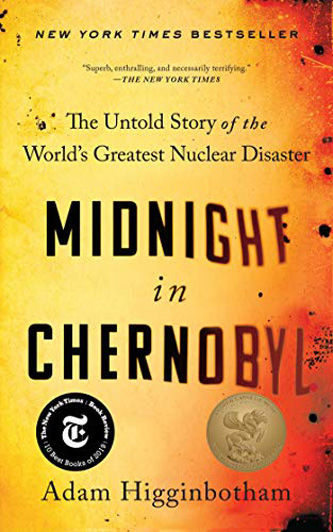
Midnight in Chernobyl tells the story of the Chernobyl disaster and its aftermath. A Booklist review reads, “Midnight in Chernobyl is top-notch historical narrative: a tense, fast-paced, engrossing, and revelatory product of more than a decade of research. ... A stunningly detailed account. ... For all its wealth of information, the work never becomes overwhelming or difficult to follow. Higginbotham humanizes the tale, maintaining a focus on the people involved and the choices, both heroic and not, they made in unimaginable circumstances. This is an essential human tale with global consequences.”
Hill, Fiona, and Clifford Gaddy. Mr. Putin: Operative in the Kremlin. 2nd ed. Brookings Institution Press, 2015. 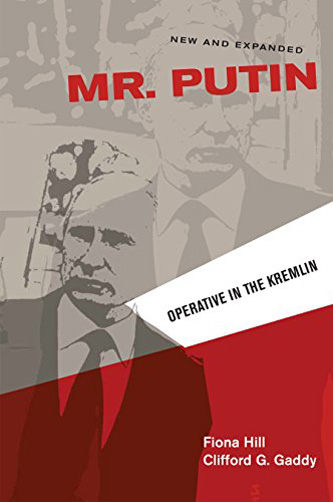
The story of Vladimir Putin, past and present, from his childhood years to becoming the head of the Russian state. The authors recount Putin’s formative experiences and how Putin’s skill as a KGB “operative” carries over into his political role.
Himka, John-Paul. “Ukrainians, Russians, and Alexander Solzhenitsyn.” Cross-Currents: A Year Book of Central European Culture 11 (1992): 193-204.
The author writes: “Solzhenitsyn is correct to believe that the Ukrainian nation emerged only after the Kievan Rus collapsed. The point he misses altogether, however, is that so did the Russian nation. It too was a product of early modern state formation, the progeny of Muscovy. If Vladimir [the grand duke of Kiev] cannot be called a Ukrainian, he cannot be called a Russian either. ...
“By the time the national revival began in the late eighteenth and early nineteen centuries, distinctive Ukrainian Russian nationalities had already come into being. They had been forged in the early modern era, in different social and political structures and in different cultural climates. They exhibited many salient differences in their customary and political institutions, in their social organization, in their literary and artistic influences. But from the point of view of the nineteen-century awakeners, the most important difference they manifested was that they spoke different languages.”
Hrytsak, Yaroslav. “Revolution of Dignity.” In Euromaidan: History in the Making, 24–30. Osnovy Publishing, 2014.
The author writes: “The survey data suggests that despite Russia’s and Ukraine’s cultural affinity, there are important differences. In the 2000s, values in the two countries shifted in opposite directions, like two ships drifting apart at sea. Most Russians choose survival values, while many Ukrainians prefer values that signify self-expression. As [American sociologist Ronald] Inglehart claims, once a shift from survival to self-expression values occurs, democracy becomes increasingly likely to prevail over authoritarian regimes. ...
“Ukrainian liberal historians [conclude that] the main difference between Russia and Ukraine is not language, religion, or even popular culture (in reality, all these aspects are quite similar), but rather fundamentally different political traditions, different relations between state and society.
“The difference has a historical background. Up to the end of the 18th century, a considerable share of ethnically Ukrainian lands stood outside the Russian sphere of influence; they were a part of the Polish-Lithuanian Commonwealth. This Polish democracy of nobles ... provided Ukraine with a strong tradition of self-government. For this reason, Russian political patterns, which brought to power the likes of Stalin or Putin, are impossible in Ukraine. Yanukovych tried to prove otherwise and was punished for this.”
Boettke, Peter J and Rosolino A Candela. “János Kornai, the Austrians, and the Political and Economic Analysis of Socialism.” Public Choice, Vol. 187 (2021): 85–97.
Abstract: What is the relationship between central planning, pervasive shortages, and soft budget constraints under socialism? In this paper, we [explore] the evolution of János Kornai’s work on the operation of real-world socialism. In doing so, our goal is to reframe Kornai’s contributions to the political economy of socialism by focusing on the [knowledge problems for decision-makers under non-market conditions]. From this perspective, we argue that the dysfunction facing socialist economies is not one based fundamentally on a misalignment of incentives in enforcing hard budget constraints and eliminating shortages. Rather, soft budget constraints are a consequence of competition between firms in a non-profit setting, utilized as a means to monetize the control over state-owned resources through the creation of pervasive shortages.
Jenkins, Simon. A Short History of Europe: From Pericles to Putin. Public Affairs, 2019.
The last chapter (23) is the one appropriate for our purposes. The author writes: “Western Europe’s response to the fall of the Soviet empire did its best to defy [Francis] Fukuyama’s optimism. There was no lowering of tariffs or other barriers to trade with the east, and therefore little stimulus to growth in the post-communist economies. ...
“Most dangerous was an instant NATO welcome to Russia’s former Warsaw Pact allies. ... [T]he Baltic states together with Poland, Czechoslovakia and Hungary turned their backs on the east. ... [T]he alacrity with which NATO seemed ready to advance its frontier eastwards rubbed salt into the gaping wound of Russia’s national pride.
“Yeltsin pleaded with the west to hold back, describing NATO’s expansion as ‘a major political mistake.’ ... He was ignored. In this respect, there was an ominous sense of the cold war’s demise replicating the casual triumphalism of Versailles. ... Estonia, Latvia, Lithuania, Bulgaria and Romania [joining NATO turned] the earlier necklace of former communist state into what looked to Moscow more like a noose. ...
“Putin repeated Yeltsin’s warning that any NATO advance to the frontier ‘would be taken in Russia as a direct threat to the security of our country.’ ... He did not like NATO’s encirclement of his borders or meddling within his ‘sphere of interest.’ ... Geography mattered.”
Kaplan, Fred. “A Bridge Too Far.” Review of Not One Inch: America, Russia, and the Making of Post-Cold War Stalemate, by M. E. Sarotte. New York Review of Books, April 7, 2022.
Kaplan writes: “Many were skeptical about the notion of [NATO] enlargement. ... Clinton’s first two secretaries of defense, Les Aspin and William Perry, feared that pushing NATO closer to Russia’s border might agitate the Kremlin into pulling out of nuclear arms–reduction talks. Many in the State Department worried that NATO’s eastward expansion might endanger Yeltsin’s fragile democratic experiment and usher ultranationalists into power.
“In May 1995 eighteen former US officials, mainly retired Foreign Service officers, signed an open letter expressing concern that NATO enlargement risked ‘exacerbating the instability that now exists in the zone that lies between Germany and Russia’ and might convince ‘most Russians that the United States and the West are attempting to isolate, encircle, and subordinate them, rather than integrating them into a new European system of collective security.’ In a New York Times op-ed, George Kennan, the dean of Russia hands and the architect of America’s cold war containment policy, agreed, castigating NATO enlargement as ‘the most fateful error of American policy in the entire post-cold-war era.’
“Senator Sam Nunn and Brent Scowcroft, who had been President [George H.W.] Bush’s national security adviser, wrote another Times op-ed, calling for ‘a definite, if not permanent pause’ to enlargement, quoting John Maynard Keynes on the errors made in the aftermath of World War I: ‘the fatal miscalculation of how to deal with a demoralized former adversary”—an error that ‘we must not repeat.’ ...
“Is NATO enlargement to blame for Putin’s revanchism, or has it served as a pretext for fulfilling his obsessive nostalgia for empire? Probably a bit of both. His resentment over Russia’s loss of empire following its cold war defeat has some valid basis. But that doesn’t give him, or the leader of any country, the right to reverse that loss by fiat and force. Three American presidents pushed NATO enlargement too eagerly, with too many insincere assurances that the latest step was the last one. NATO’s declaration at Bucharest that Ukraine and Georgia ‘will’ be brought into the alliance at some point was a profound error, as most member states realized at the time. ...”
Kennan, George F. “A Fateful Error.” New York Times, February 5, 1997.
Kennan (the architect of the U.S. containment policy during the Cold War) writes, “[E]xpanding NATO would be the most fateful error of American policy in the entire post-cold-war era. Such a decision may be expected to inflame the nationalistic, anti-Western and militaristic tendencies in Russian opinion; to have an adverse effect on the development of Russian democracy; to restore the atmosphere of the cold war to East-West relations, and to impel Russian foreign policy in directions decidedly not to our liking. ...
“Russians are little impressed with American assurances that it reflects no hostile intentions. They would see their prestige (always uppermost in the Russian mind) and their security interests as adversely affected.”
Khodorkovsky, Mikhail, with Martin Sixsmith. The Russia Conundrum: How the West Fell for Putin’s Power Gambit — and How to Fix It. W.H. Allen, 2022.
Neil Buckley writes: “The Russia Conundrum offers a useful and readable primer on the vengeful, nationalistic greed of the Putin circle. It is the story of a takeover of state power by Putin, his cronies, and the security services in the shape of the FSB, which emerged from the post-Soviet remnants of its predecessor, the much-feared KGB.
“Others have told this tale before, but Khodorkovsky does so from the vantage point of an insider who, in the early years, frequently sat across the table from Putin, then felt at first hand the president’s wrath. ...
“The crushing of Khodorkovsky, after he publicly accused the president of corruption, was the key turning point. [Classical] liberal elements lost out to hardliners in a Kremlin power struggle; the experiment with free-market democracy was snuffed out. The historic pendulum had swung back in Russia’s centuries-old struggle between ‘westernisers’ who believe in openness, and ‘Slavophiles’ who glorify ‘Russian nationalism, isolationism and quasi-feudal authoritarianism.’“
Krasnozhon, Leonid, and Bunyk, Mykola. “Liberalism and Great Upheaval: What Did Classical Liberals Do in the Tsarist Russia?” Constitutional Political Economy 30 (2019): 96–113. [Download PDF]
From the abstract: “This paper studies how constitutional bargaining leads to a negative-sum game in a transitional illiberal environment. We use a historical example of the Russian constitutional monarchy (1905–1917) to demonstrate that an exchange-based constitutional change within the king-council model leads to an inefficient outcome when bargaining parties fail to trade political authority for policy results. The historical example of the Russian constitutional monarchy shows how both radicalization of the liberal parliamentary majority and pseudo-constitutionalism of Nicholas II undermined efficiency of the legislative assembly. We also find that nationality-based politics undermined the constitutional bargaining by radicalizing both the liberal movement and the tsar.”
Krasnozhon, Leonid. “Institutional Stickiness of Democracy in Post-Socialist States: Can Prevailing Culture Explain It?” Review of Austrian Economics 26, no. 2 (2013): 221–37. [Download PDF]
From the abstract: “Using transitional experience of post-communist countries, I demonstrate that institutional stickiness of [constitutional] democracy depends on a combination of causal factors, including underlying political culture.”
Krasnozhon, Leonid. “Lessons of Privatization: Property Rights in Agricultural Land in Ukraine.” Economic Education Bulletin 45, no. 5 (May 2005): 123–36.
From the abstract: “This paper consists of a historical overview of property rights in agricultural land. The review starts when Ukraine was a part of the Russian Empire and continues through the period of the former Soviet Union into the present, when Ukraine is an independent nation. The focus of the paper is the transformation of property rights in land in Ukraine through the process of privatization.”
Krauss, Melvyn B. “Do We Need New Allies? No, It’s Just Welfare for Europe.” Wall Street Journal, March 12, 1998.
Economist Melvyn Krauss, author of How NATO Weakens the West (1986), argued in the late 1990s against NATO expansion. He contended that securing Eastern Europe is overwhelmingly a European problem, not a U.S. one; that NATO is a defense umbrella paid for American taxpayers that subsidizes free-riding European welfare states, and that Western European states have protectionist economic policies that stand in the way of an opening to Eastern Europe.
Krauss writes: “The history of NATO has been one of Americans doing the securing and Europeans doing the collecting. In the post–World War II period, for example, the Western Europeans constructed the most elaborate welfare states known to man with the resources they would otherwise have had to spend on their own defense had the United States not done the defense spending for them. ...
“Securing Eastern Europe is essentially (though not exclusively) a European problem. But the Western Europeans would be able to transfer a disproportionate share of the cost to the United States by making the protection of the Czech Republic, Hungary, and Poland a NATO responsibility. ...
“Excluding them from the [European Union] has increased pressure for NATO expansion. The reason the Czech Republic, Hungary, and Poland are being kept out of the European Union is Western European protectionism. Inclusion of Eastern European farmers in the highly protectionist EU Common Agricultural Policy would be an expensive proposition for Brussels. Western European manufacturers fear price competition from their Eastern European counterparts who pay lower wages. And Western European trade unions fear wage competition from their Eastern European neighbors.”
Kulyk, Volodymyr. “National Identity in Ukraine: Impact of Euromaidan and the War.” Europe-Asia Studies 68, no. 4 (2016): 588-608
Kulyk writes: “Euromaidan, like the Orange Revolution, was perceived by its participants and sympathisers as a unifying popular protest against the corrupt authoritarian regime, but the [Yanukovych] regime sought to weaken the protest by presenting it as led by the westerners [inhabitants of western Ukraine] and hostile to the easterners. Similarly, while Russia justified its intervention in the Crimea and Donbas by its concern for the Russian speakers of those and adjacent regions, many members of different linguistic and regional groups viewed it as aggression against the entire Ukrainian people who, accordingly, must unite, resist and make an alliance with the West. The two processes can thus be expected to have caused significant changes both in the salience of national identity and in some aspects of its content, changes that can vary by the region and language of preference. It is these changes that the present study seeks to examine. ...
“[N]ational identity has become more salient vis-à-vis other territorial and non-territorial identities than it was before the Maidan and the [2014] war. ... On the other hand, the very meaning of belonging to the Ukrainian nation has changed, a change most vividly manifested in the increased alienation from Russia and the greater embrace of Ukrainian nationalism as a worldview and, accordingly, as a historical narrative.”
Kundera, Milan. “An Introduction to a Variation.” New York Times Book Review, January 6, 1985.
The Czech novelist Kundera writes in this introduction to his play “Jacques and His Master”: “Dostoyevsky’s universe of overblown gestures, murky depths and aggressive sentimentality repelled me. ...
“What irritated me about Dostoyevsky was the climate of his novels: a universe where everything turns into feeling; in other words, where feelings are promoted to the rank of value and of truth.
“Man cannot do without feelings, but the moment they are considered values in themselves, criteria of truth, justifications for kinds of behavior, they become frightening. The noblest of national sentiments stand ready to justify the greatest of horrors, and man, his breast swelling with lyric fervor, commits atrocities in the sacred name of love.
“When feelings supplant rational thought, they become the basis for an absence of understanding, for intolerance; they become, as Carl Jung has put it, ‘the superstructure of brutality.’ ...
“But from the Renaissance on, this [elevation of] sensibility has been balanced [in the West] by a complementary spirit: that of reason and doubt, of play and the relativity of human affairs. It was then that the West truly came into its own.
“In his celebrated Harvard speech [“A World Split Apart,” June 8, 1978], Solzhenitsyn places the starting point of the current crisis of the West squarely in the Renaissance. It is Russia – Russia as a separate civilization – that is explained and revealed by his assessment, for Russia’s history differs from the history of the West precisely in its lack of a Renaissance and of the spirit that resulted. That is why the Russian mentality maintains a different balance between rationality and sentiment; in this other balance (or imbalance) we find the famous mystery of the Russian soul (its profundity as well as its brutality).”
Kuper, Simon. “Splendid Isolation? Most People Prefer Globalisation.” Financial Times, July 28, 2022.
Simon Kuper writes: “The Ukraine war, often described as a battle for democracy, is just as much one for globalisation. ... [T]oday’s isolated countries yearn to globalise. After communism fell, Ukraine watched its globalising neighbour Poland run away from it. In 1990, both countries had about the same income per capita. Polish incomes have since approximately tripled, whereas Ukraine is poorer than 30 years ago. ...
“For European countries, joining the world tends to start with joining the EU. That’s why Ukraine’s MPs stood and clapped in unison on July 1 [2022] when soldiers carried the European flag into the chamber. The EU this summer granted Ukraine and Moldova candidate status and started accession talks with Albania and North Macedonia. But Russia wants its neighbours to follow its retreat from all forms of globalisation except commodity exports. When [Russia] first invaded Ukraine in 2014, it hoped to stop [Ukraine from] signing an association agreement with the EU.”
Leeson, Peter, and William Trumbull. “Comparing Apples: Normalcy, Russia, and the Remaining Post-Socialist World.” Post-Soviet Affairs 22, no. 3 (2006): 225–48. [Download PDF]
Abstract: “Shleifer and Treisman (2005) argue that Russia is a ‘normal country’ but their benchmark for normalcy refers primarily to middle-income countries like Mexico and Argentina. Drawing on data from the World Bank and Transparency International, [economists Leeson and Trumbull] explore this argument by placing Russia in a different context. Russia’s experience is examined in comparison with other post-socialist transition countries sharing common political and economic histories with Russia, which have faced similar transition obstacles since communism’s collapse. Russia’s economic performance, media freedom, democracy, and corruption since transition are compared to these benchmarks in all other post-socialist countries since they began their transitions.”
Lieven, Anatol. Ukraine and Russia: A Fraternal Rivalry. Institute of Peace Press, 1999.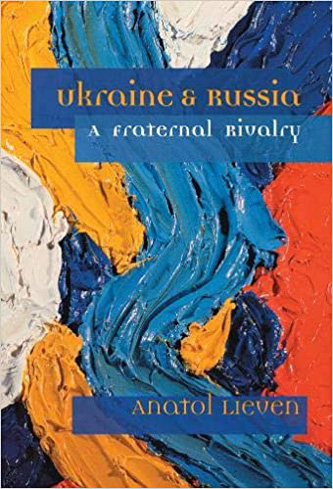
The author writes: “The statement by many contemporary Ukrainian historians that Kievan Rus was a ‘Ukrainian state’ is ... as absurd as that by Russian historians that it was a ‘Russian state.’ ...
“Generations of scholars in the West have now demonstrated that while ethnic differences may be primordial, the identity of most modern nations in the full sense is very much a product of the past few centuries, and cannot be read back into earlier epochs. From this point of view, it makes as much sense to talk about a Ukrainian or Russian state or nation existing a thousand years ago as it would be to talk of the empire of Charlemagne as a ‘French state’ or [the kingdom] of Alfred the Great as a ‘British state.’”
Magocsi, Paul Robert. A History of Ukraine: The Land and Its Peoples. 2nd ed. University of Toronto Press, 2010.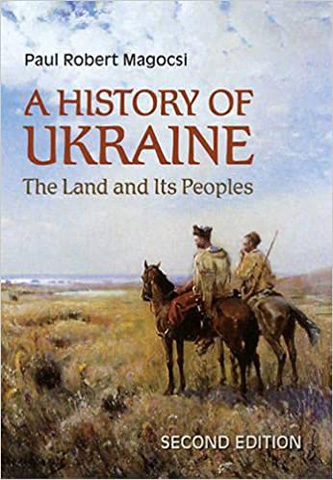
Robert Legvold writes, “This is a magisterial history, not because of its bulk but because it deals clearly and well with a vast number of fundamental themes over a thousand-year period. Magocsi has wisely chosen to write this comprehensive history not of the Ukrainian ethnocultural or linguistic people, but of the Ukrainian land and all the peoples who have fought over, thrived in, and suffered upon it, from the ancient Scythians and the brutalized 500-year peace they guaranteed through the Lithuanian-Polish period of the mid-fourteenth to the mid-seventeenth centuries, through the 263 years under the Romanovs, to the present day.
“Patiently but firmly, Magocsi rejects the Russian historical tradition, which treats the Ukrainian experience as but a rib in the more encompassing history of Russia, and so, too, its Polish counterpart, which over the ages regarded the western half of modern Ukraine as merely the uncivilized but rightful borderland of the Polish empire. Instead he builds from the premise that Ukraine and its denizens, whether the ancient Rus of Kiev, the post-medieval Zaporozhian Cossacks, or the adherents of national movements of the nineteenth century, have a separate and distinguishable history, often infused with values quite different from those of the Russians.”
Magyar, Bálint, and Bálint Madlovics. The Anatomy of Post-Communist Regimes: A Conceptual Framework. Central European University Press, 2021.
Among many other fascinating sociological insights, the authors contrast the “invisible hand” classical-liberal system with the “grabbing hand” system of a predatory state. They divide the grabbing-hand systems into three categories: (1) Communist totalitarianism, (2) the mafia state, which takes from disloyal outsiders and gives to loyal insiders; and (3) the failed state, where unorganized bureaucrats employ predatory practices unsystematically. In the mafia state, which is typical of post-Communist states like Russia, the ruler has captured three things: (1) the state; (2) commerce; and (3) the big businessmen who run state-sanctioned monopolies. The authors consider such a mafia state as essentially different from “invisible hand” systems.
Magyar, Bálint. Post-Communist Mafia State: The Case of Hungary. Central European University Press, 2016.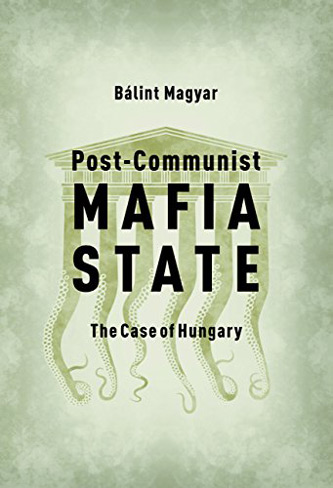
Some post-Communist countries are now mafia states. Viktor Orbán’s Hungary is one of them, but not the only one. As Kim Lane Schepple writes in the Foreword: “Many post-Communist countries are clearly wrestling with similar tendencies.” Schepple goes on to say: “If there were any doubt about the creativity of the Orbán team in privatizing the goodies of governance while collectivizing its costs, this book details precisely how they did it.”
Malinova, Olga. “Russian Political Discourse in the 1990s: Crisis of Identity and Conflicting Pluralism of Ideas.” In Identities and Politics During the Putin Presidency: The Foundations of Russia’s Stability. Ed. by Philipp Casula and Jeronim Perovic. Ibidem-Verlag, 2009. Pp. 94-111.
This article examines the struggle between competing political approaches after a regime falls and there is a crisis of legitimacy and hence an opening for new ideological foundations. The main competing approaches in post-Communist Russia were nationalism and classical liberalism. The classical liberals held that human rights and an independent civil society could only be sustained if the economy were based on private property and the free market. Underneath the dense prose of sociolinguistics and discursive analytics, Malinova makes the important point that during the Yeltsin years, the classical liberals (Yabloko, the Union of the Right Forces, and some of the mass media) neglected myth, heroes, and symbolic images, whereas the nationalist camp (which included far left groups) cultivated such matters. This meant that Putin, when he came to power, could turn to patriotism and anti-Western nationalism as ideological props for his rule.
Marshall, Tim. Prisoners of Geography: Ten Maps That Explain Everything about the World. Scribner, 2016.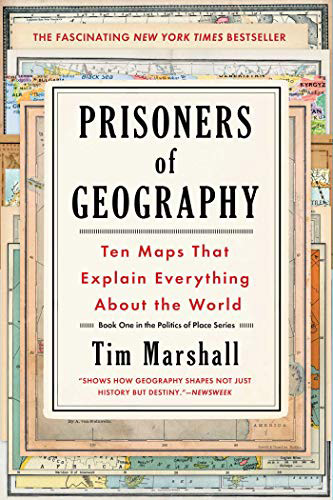
Simon Jenkins writes: “Marshall’s book remains the most succinct guide to what is happening in Ukraine today.” Most important for our purposes is chapter 1, “Russia,” which includes a compact account of geo-strategic aspects of Russo-Ukrainian relations. On the first page of the book, Marshall points out that the North European Plain (which includes Ukraine) has “repeatedly” been “an encouraging territory from which to attack Russia.” During the past five hundred years, Russia has been fighting “in or around” the North European Plain “once every thirty-five years.”
Marshall goes on to say: “As long as a pro-Russian government held sway in Kiev, the Russians could be confident that its buffer zone would remain intact and guard the North European Plain. Even a studiedly neutral Ukraine, which would promise not to join the EU or NATO ... would be acceptable. ... A Ukraine that one day might even host a NATO naval base? That could not stand. ...
“From the Grand Principality of Muscovy, through Peter the Great, Stalin, and now Putin, each Russian leader has been confronted by the same problems. It doesn’t matter if the ideology of those in charge is czarist, Communist, or crony capitalist ... the North European Plain is still flat.”
McFaul, Michael. Russia’s Unfinished Revolution: Political Change from Gorbachev to Putin. Cornell University Press, 2002.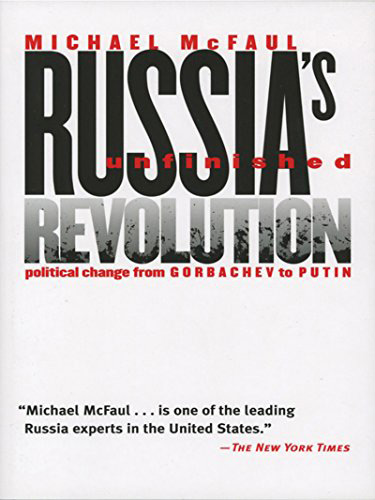
This analytic account of political change in post-Soviet Russia was written before the author became U.S. Ambassador to Russia under Obama. McFaul writes: “[T]he very perception that the president has too many powers means superpresidentialism is an impediment to democratic consolidation. And a vigorous president with an aggressive agenda, such as Vladimir Putin, may be able to take advantage of these presidential powers to pursue policies that further impede the development of liberal democracy. A powerful presidency is simply not good for the development of liberal democracy.”
McMeekin, Sean. “Putin, Russia, and Ukraine: Historical Roots of a Tragedy,” Chronicles Magazine, March 1, 2022.
MeMeekin writes: "[T]o claim, as Putin does, that Ukraine has never really existed as a separate nation other than in 1917-18 and after 1991 is to ignore not just the contested matters of deep Russian history but, more significantly, the turbulent history of Ukraine during the 20th century. ...
"As if the trauma of civil war, foreign intervention, pogroms from 1918 and 1921, Holodomor [Stalin’s terror-famine] in the early 1930s, Terror in the late 1930s, Germano-Romanian invasion, war and genocide after 1941 were not enough, Ukraine faced another half-decade of horrors after being “liberated” by the Red Army in 1944. ... Indeed, when the idea of genuine Ukrainian independence emerged in the glasnost years of the late 1980s, it was largely on the basis of shared national suffering and trauma. ... For Putin to dismiss the force of this shared history of trauma in forming a genuine Ukrainian national identity is not just insensitive, but deeply ahistorical."
McNeal, Robert H. Tsar and Cossack, 1855-1914. St. Martin’s Press, 1987.
The author writes: “[T]he myth of the free Cossack ... was rooted in the origins of the Cossacks, men who fled the serfdom of the Polish-Lithuanian and Muscovite states to the free steppe, the land [in Ukraine] between the Slavic states of the north and the Turkish-Tatar sphere along the Black Sea littoral. ...
“These communities, although culturally rudimentary and violent, took real pride in their independence and democracy. Their assemblies, called the ‘krug’ (circle) among the Don Cossacks, elected their leaders, the ‘atman’ and his deputy the ‘esaul,’ ... among others. Those elected held office at the pleasure of the krug and returned to the ranks when replaced. ...
“On this basis arose the image of the free warrior, which survived even into the twentieth century, when there were some efforts to merge it with [classical] liberalism. ... [T]he main theme of Cossack history became the decline of Cossack liberty and the rise of tsarist control. ... The most extended version of the argument that ancient Cossack liberty should be regarded as the ancestor of [classical] liberalism is provided by [historian Sergei G.] Svatikov.”
Mearshimer, John J. “Why the West Is Principally Responsible for the Ukrainian Crisis.” The Economist, March 19, 2022.
John Mearsheimer, the dean of realist international relations scholars, writes: “The West, and especially America, is principally responsible for the crisis which began in February 2014. It has now turned into a war that not only threatens to destroy Ukraine, but also has the potential to escalate into a nuclear war between Russia and NATO.
"The trouble over Ukraine actually started at NATO’s Bucharest summit in April 2008, when George W. Bush’s administration pushed the alliance to announce that Ukraine and Georgia ‘will become members’.”
Russian leaders responded immediately with outrage, characterising this decision as an existential threat to Russia and vowing to thwart it. ... America ignored Moscow’s red line, however, and pushed forward to make Ukraine a Western bulwark on Russia’s border. That strategy included two other elements: bringing Ukraine closer to the EU and making it a pro-American democracy.”
“These efforts eventually sparked hostilities in February 2014, after an uprising (which was supported by America) caused Ukraine’s pro-Russian president, Viktor Yanukovych, to flee the country. In response, Russia took Crimea from Ukraine and helped fuel a civil war that broke out in the Donbas region of eastern Ukraine.”
“The next major confrontation came in December 2021 and led directly to the current war. The main cause was that Ukraine was becoming a de facto member of NATO. The process started in December 2017, when the Trump administration decided to sell Kyiv ‘defensive weapons.’ What counts as ‘defensive’ is hardly clear-cut, however, and these weapons certainly looked offensive to Moscow and its allies in the Donbas region. Other NATO countries got in on the act, shipping weapons to Ukraine, training its armed forces and allowing it to participate in joint air and naval exercises.”
Menon, Rajan, and Eugene B. Rumer. Conflict in Ukraine: The Unwinding of the Post-Cold War Order. Boston Review Originals/MIT Press, 2015.
This book is valuable for showing that although the political players at the top changed in Ukraine, pervasive corruption went on. For example, when a monopolistic state-owned telecommunications enterprise was privatized, only a pre-selected single bidder was allowed, and ten other bids were blocked. Although ruling politicians attempted to corral the news media, Menon and Rumer importantly point out, “competition between business groups with competing interests” sustained a “relatively free” press in Ukraine.
Daniel Abebe writes: “At first glance, the [2014] conflict between Russia and Ukraine seems like the same old story. Russia, this story goes, is an imperial power, hoping to regain the superpower status it lost at the end of the Cold War. ...
“Rather than blaming Russia for causing the crisis – as many in the popular press have – Menon and Rumer challenge the simplistic view that Russia is the ‘singular villain’ in the conflict. They describe how the EU’s and NATO’s expansion, both economically and militarily, threatens Russian interests in its traditional sphere of influence and encourages Russian resistance to the West’s encroachment. As they put it, ‘Imagine what the American reaction would have been had the Soviet Union won the Cold War, incorporated Canada and Mexico and the other Central American states into the Warsaw Pact, and declared that Washington had no cause to worry, its historic vital interest in these places notwithstanding.’ ...
“EU enlargement and NATO expansion in particular, by including former Warsaw Pact countries, began to encroach on Russia’s 'privileged interests' in its near periphery without a clear strategic justification. ... [F]or Russia [NATO expansion] was a provocative attempt by NATO to move closer to Russia’s doorstep and further humiliate a fallen world power.”
Miliukov, Paul. Political Memoirs, 1905–1917. Edited by Arthur P. Mendel. Translated by Carl Goldberg. University of Michigan Press, 1967.
The detailed and fascinating memoirs of the political leader of the classical-liberal Constitutional Democratic (Kadet) Party. Includes a brief discussion of the differences between the leaders of the Ukrainian Rada Republic (who sought independence in 1917) and the Kadet leaders in the Provisional Government (who proposed autonomy for Ukraine within Russia).
Miliukov, Paul. “Russia’s History and Culture.” In The Russian Revolution and Bolshevik Victory: Why and How? 1–7. Edited by Arthur E. Adams. D.C. Heath, 1960.
An excerpt from Miliukov’s History of the Second Russian Revolution. The author was both a historian and the political leader of the classical-liberal Constitutional Democratic (Kadet) Party. He argues here that the supposed reforms put in effect after the Revolution of 1905 by the tsarist government were Scheinkonstitutionalismus (pseudo-constitutionalism). The Court, the powerful State Council, and the bureaucracy were isolated from the educated intelligentsia and the rest of society. The mock constitutionalism was a sham without genuine constitutionally governed popular participation. This pretense and reformers’ feelings of hopelessness encouraged maximalist revolutionary sentiments among the intelligentsia.
Miller, Paul D. “Pope Francis on Just War and Ukraine.” Providence Magazine, March 23, 2022.
The author writes: “Patriarch Kirill of the Russian Orthodox Church, ... is a perfect example of what happens when a church gets too close to the state. In supporting Vladimir Putin’s war, he has allowed his moral authority to be coopted by an authoritarian to be used as a fig leaf for a murderous war of conquest, cheapening and undermining the theological language Christians have long used to think about justice and war. ...
“[Pope Francis] is right that aggressors and their shills too easily manipulate the language of just war to claim every military adventure is justified. But he goes further than that. ‘We can no longer think of war as a solution, because its risks will probably always be greater than its supposed benefits,’ he writes. ‘In view of this, it is very difficult nowadays to invoke the rational criteria elaborated in earlier centuries to speak of the possibility of a “just war.”’...
“But what if these claims are not true? Pope Francis’ claim that ‘every war leaves our world worse than it was before,’ seems obviously wrong, or at least wrongly framed. The question is not whether war leaves the world worse off than it was before, but whether fighting a war makes the world worse compared to how it would otherwise be. ...
“Francis’ view implies a utopian politics in which we could always choose the best rather than the real world in which we often must choose the lesser of two evils. ...
“This points to the incoherence of Pope Francis’ comments about just war. Even as he criticized just war language as part of his criticism of Patriarch Kirill, he affirmed the Ukrainians’ right to defend themselves. As virtually everyone knows, that is exactly what the just war tradition affirms. The just war tradition affirms that it is just for the Ukrainians to wage war in defense of their lives, their independence, and their freedom. Francis criticizes the language of the just war tradition while affirming its content and conclusions, seemingly unaware of the obvious contradiction.”
Motyl, Alexander J. Ukraine vs. Russia: Revolution, Democracy, and War. Westphalia Press, 2017.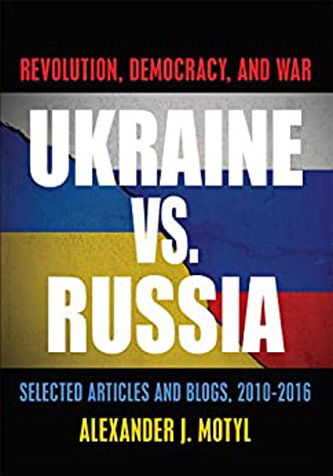
These are articles and blog posts that Motyl, a professor of political science at Rutgers-Newark, published from 2010 through 2016. The author writes: “The articles are all analytical, sometimes even theoretical, but they are all rooted in certain normative beliefs. I openly and proudly detest Putin’s fascist dictatorship [in Russia] and [Viktor] Yanukovych’s corrupt sultanistic regime [in Ukraine]. I unabashedly support democracy, human rights, liberalism, and market reform.”
Motyl, Alexander J. Vovochka: The True Confessions of Vladimir Putin’s Best Friend and Confidant. Independently Published, 2021.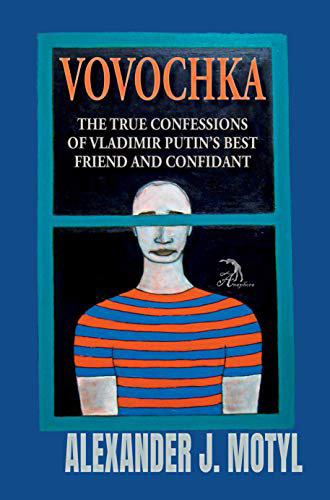
Michael Johnson in his review of the book in The American Spectator says, “This book is long overdue — a sendup of Russian President Vladimir Putin, the macho horseman and judo master so often photographed with rippling pecs. The reality, says this comic novel, is quite the opposite. ... Motyl pulls off a fine-tuned parody by using hackneyed Soviet language and blinkered thinking to recount historic and possible future events. The results are hilarious and often revealing of how the old Soviet mindset lives on. ... Motyl’s story succeeds on two levels: it overlays actual events with a slightly skewed fictional story, and it exploits the bombast of Russian officialdom by pretending to take it seriously. The result is a parody in the great tradition of free expression.”
Nabokov, V. D. V. D. Nabokov and the Russian Provisional Government, 1917. Edited by Virgil D. Medlin and Steven L. Parsons. Yale University Press, 1976.
V. D. Nabokov was a prominent legal figure in pre-Communist Russia and a leader of the classical-liberal Constitutional Democratic (Kadet) party. He was the father of the novelist Vladimir Nabokov. These are his fair-minded memoirs relating his experiences at the heart of the Russian Provisional Government that came into existence after the February 1917 Revolution.
Nabokov, V.D. The Provisional Government, ed. Andrew Field, trans. A.G.E. Speirs. John Wiley & Sons, 1970.
Believe it or not, there are two translations of the senior Nabokov’s memoirs of the 1917 Russian Provisional Government, where he was Executive Secretary of the Council of Ministers. This version includes as an Appendix the passages about his father from the autobiography (Speak, Memory) of the novelist Vladimir Nabokov. This one also includes a brief but valuable Introduction by Richard Pipes sketching the history and program of the Kadet political party, of which the senior Nabokov was a leading figure.
Pipes writes: “The Constitutional Democratic Party of which Vladimir Nabokov père was one of the founders and leaders was the most influential party in pre-revolutionary Russia. It was the Kadets who demanded and won for their country a constitution and in the Dumas created by it performed the role of the loyal opposition.
“Nor did their activity end there. After the abdication of Nicholas II in 1917 they assumed responsibility for administering the empire. Subsequently, they furnished political leadership to the White movement, and, after its collapse, did more than any other party to keep alive the national spirit among the two million Russian émigrés.
“If these facts are not generally known it is largely because since 1917 control over Russian historical scholarship has been excercised by a political party which detested [classical] liberalism more than any other political movement, and has done all in its power to expunge its traces from the record. ... The trouble is that history does not judge: the judging is done by historians who are coercible and corruptible, and always find the winners more interesting than the losers. ...
“They were admirable men, the Russian [classical] liberals, combining Western individualism with the intelligentsia’s tradition of public service. ... Russia owes them a great deal. Some day it will recognize that debt. ...”
Nelson, Scott Reynolds. Oceans of Grain: How American Wheat Remade the World. Basic Books, 2022.
Thomas J. Grennes writes: “[A]fter 1865, ... that United States [became] a major producer and exporter of grain. ... Russian leaders, including Prime Minister Sergei Witte and Finance Minister Ivan Vyshnegradsky, sought to regain Russia’s export prominence.
“They promoted a long and costly railroad expansion through Siberia to Port Arthur in Manchuria, believing it would become a major port for Russian grain exports to the Pacific.
“Japan resented the Russian encroachment in their neighborhood and defeated Russia in the Russo-Japanese War of 1905. ... Nelson suggests that the humiliating military defeat may have contributed to Russia’s participation in World War I, [which] drove Russia into revolution.”
Ostrovsky, Arkady. The Invention of Russia: The Rise of Putin and the Age of Fake News. Penguin Books, 2017.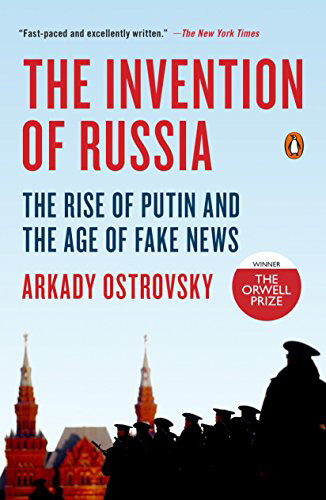
Ostrovsky’s history explains the role Russian media has played in Russia’s trajectory after the Soviet Union, ultimately culminating in influential oligarchs and Putin’s information-control playbook.
Ostrowski, Donald. Muscovy and the Mongols: Cross-Cultural Influences on the Steppe Frontier, 1304-1589. Cambridge University Press, 2002.
By the 14th century, the principle that the land belongs to the ruler had been adopted by the grand princes of Muscovy. They borrowed it from the Mongols, who in turn had taken it from the Chinese. Muscovy borrowed theories of ruler legitimacy from Greek Orthodox Byzantium. But medieval Muscovy was not despotic in either theory or practice. Furthermore, neither were the Byzantine or Mongol empires. In both, Ostrowski points out, “there were well established limitations on the power and authority of the ruler.” Ostrowski interprets Ivan the Terrible’s Oprichnina as an effort by Ivan to establish a-state-within-a-state obedient to him and in opposition to the Church and the boyars allied with the Church. The reign of terror conducted by the Oprichnina was inflicted not only on disfavored persons, but collectively on their male relatives, retainers, and servants -- a principle of collective guilt (taken over from the Mongols and Chinese) that returned to Russia during the Bolsheviks’ Red Terror.
Pejovich, Svetozar. “Liberman’s Reforms and Property Rights in the Soviet Union.” Journal of Law and Economics 12, no. 1 (1969): 155–62.
What were the economic weaknesses of the reforms Evsei Liberman proposed in 1964? Would the Soviet authorities in the 1960s grant to enterprise managers the de facto property rights they needed to make rational economic decisions? Rosolino A. Candela writes, “The difference between capitalist and socialist systems in economic performance, [according to Pejovich,] is based neither on the degree of benevolence or malevolence on the part of decision makers governing the system or acting within the system nor on the existence or absence of profit opportunities in the system but upon what individuals identify as relevant knowledge available to them and how they learn to achieve their goals, given the prevailing structure of property rights.”
Pipes, Richard. Property and Freedom: The Story of How through the Centuries Private Ownership Has Promoted Liberty and the Rule of Law. Alfred A. Knopf, 2000. [Download PDF]
Walter Olson writes: “The fork in the road between Britain and Russia, it would seem, came on the issue of whether the ruler could be said to own everything in the country. In England, this idea was challenged and then rejected with the revolutionary consequence that the king had no more right to trespass on an Englishman’s freehold than anyone else did. Nor (eventually) could he exact financial penalties from his subjects – or do much of anything else, such as take away life and liberty – without due process of law. The idea that rights were something prior to government soon made England the most property oriented country on earth.
“By contrast, in unhappy Russia, the czars’ claim to own everything carried only too much weight. The members of the Russian nobility often found themselves acting as collectors of tribute on highly revocable allotments. Serfdom persisted because the obligations of nominal landowners to the crown were too onerous to be met any other way. Whole categories of economic endeavor, such as coach inns and flour mills, were decreed to be the property of the royal family. When Lenin sought to ensure submission to the authority of his Soviets by ordering the pulping of old title deeds, he was acting in the tradition of the worst czars.”
Peter Mentzel also writes: “The history of Russia is so different from that of England, Pipes argues, largely because of the historically weak tradition of private property in Russia. Pipes uses the Weberian concept of a ‘patrimonial’ state to describe Russia. Unlike their counterparts in England (or, indeed, in western Europe in general), the Russian monarchs historically considered themselves and were considered by others as not only the rulers but the owners of their realm. Although private property existed, it did not exist independently of the state, but ‘emanated from it’ in the form of isolated, sometimes even arbitrary, grants by the ruler to individual subjects. Because the Russian nobles (and everyone else, for that matter) held their property at the sufferance of the state, the czars had no great incentive to work with a parliament. In Pipes’s formulation, the lack of a strong tradition of private property led to a retardation in the development of the idea of individual liberty and to the absence of powerful representative institutions for most of Russian history.”
Pipes, Richard. Struve: Liberal on the Right, 1906–1944. Harvard University Press, 1980.
Here are some Austrian School economic principles of Peter B. Struve, an economist and a leading theoretician of the Constitutional Democratic (Kadet) Party in early twentieth-century pre-Communist Russia:
“[Struve] faithfully followed [C]arl Menger, the founder of the so-called Austrian School and perhaps the economist who influenced him most, in emphasizing the importance of formulating concepts of ‘pure’ economics optimally isolated from the historic and social environment in which they work themselves out. ...
“The advocacy of economic regimentation (planned economy) which, in Struve’s view, constitutes the irreducible plank of all socialist doctrines, postulates the capacity of ‘reason’ to understand and direct human affairs. ...
“The issue dividing these two dominating theories of modern times [classical liberalism and socialism] ... is over the way [harmony between thought and action] can best be realized: the liberals expect it to occur spontaneously, through the free play of market forces; the socialists consciously, by an act of [political] will. ...
“[Struve] recognized the utility of theory and did not sympathize with the extreme antitheoretical stand favored by the old German historical school. ...
“[The nature of socioeconomic processes] set limits on the extent to which any society can be ‘rationalized’ or ‘socialized.’ That is, subordinated to the calculating intelligence of a single will. ...
“In two books published in 1883 and 1884, [C]arl Menger challenged the whole historical [school] approach as faulty in its theoretical foundations and confused in application. Some basic economic phenomena occurred outside the confines of time and space, he argued, and the task of the economist was to isolate them. ... The ‘ideal types’ of Max Weber were an effort to achieve a synthesis between the historical and antihistorical approaches. ... After initial hesitation Struve sided with Menger and Weber.
“Outside of the act of exchange, where prices are made, there can be no conceivable equality or ‘equilibrium’ of offer and demand. There exists, therefore, nothing that corresponds to curves of supply and demand of equilibrium theory. ... Insofar as the concept of equilibrium has any place in economics at all, it is in the sense of a ‘kinetic equilibrium’ of modern chemistry.”
Plokhy, Serhii. Chernobyl: The History of a Nuclear Catastrophe. Basic Books, 2018.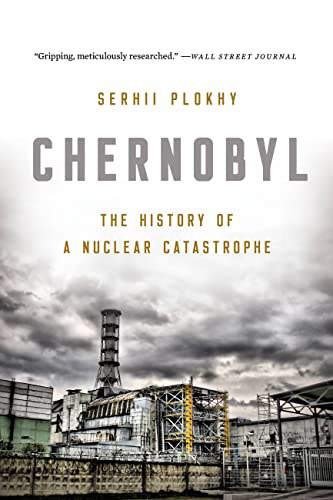
Journalist Daniel Beer writes: “In this compelling history of the disaster and its aftermath, Serhii Plokhy presents Chernobyl as a terrifying emblem of the terminal decline of the Soviet system. The turbine test that went catastrophically wrong was not, he argues, a freak occurrence but a disaster waiting to happen. It had deep roots in the party’s reckless obsession with production targets and in the pliant nuclear industry’s alarming record of cutting corners to cut costs.
“If the Soviet command economy was the ultimate villain at Chernobyl, it came into its own in the Herculean clean-up operation. Close to 600,000 Soviet citizens, many of them army reservists, were mobilised at great personal risk to gather up radioactive debris scattered by the explosion, demolish irradiated villages and move contaminated soil. The military buried the ‘Red Forest,’ a four-square-mile expanse of pine trees that had turned red after absorbing radiation.”
Plokhy, Serhii. The Frontline: Essays on Ukraine’s Past and Present. Harvard University Press for the Ukraine Research Institute, Harvard University, 2021.
This book consists of 21 first-class essays on Ukrainian history from the late 1500s to the present. For our purposes, four chapters are the most important. Chapters 7 and 8 are on Stalin’s terror-famine in the 1930s – particularly fascinating is how the Soviets crafted the UN definition of genocide to technically exclude the Holodomor. Chapter 18 (“The Russian Question”) is a condensed version of the argument in the author’s history of Russian nationalism, Lost Kingdom.
In chapter 19 (“The Quest for Europe”), the author writes: “[Nineteenth-century thinker] Mykhailo Drahomanov ... took issue with the Russian claims that Muscovite rule over Ukraine was responsible for abolishing the old ‘disastrous’ Cossack way of life and introducing new European mores. The Muscovite tsars, he argued, did not introduce European methods of government but absolutism and arbitrary bureaucratic rule. ...
“According to Drahomanov, Ukraine had good prospects of developing its own freedoms and liberties from the modest beginnings apparent in the Europe of that day. ... ‘[D]uring the [two hundred years] when Ukraine was united to Muscovy, with its autocratic tsar and legal serfdom and non-existent education,’ [Drahomanov wrote,] ‘Russian despotism gradually brought about the destruction of Ukraine’s freedom.’”
Plokhy, Serhii. The Gates of Europe: A History of Ukraine. Basic Books, 2021.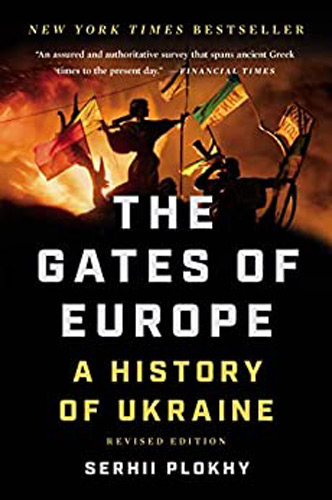
Historian Elizabeth Jones writes: “From ancient times to the election of President Volodymyr Zelensky, and the first impeachment trial of former US president Trump, Plokhy explores how ... countervailing pressures have shaped a distinct Ukrainian identity.
“Plokhy’s account of Ukrainians’ centuries-long struggles to preserve and protect their land, language, and traditions against the domination of their larger eastern neighbor, whether Muscovy, the Soviet Union, and now Russia, will come as no surprise – and reflects the success of Russian dogma about Ukraine, or Little Russia, as integral to its empire.
“The most unfamiliar strand of Plokhy’s narrative, as the book’s title announces, is the degree to which Ukrainians have absorbed and refashioned the enlightenment sciences, western European ideals of democratic governance, and the importance of a vibrant civic culture.
“In the book’s second half, Plokhy surveys Ukraine’s tragic milestones in the last century: the anti-Jewish pogroms following the 1905 Russian Revolution, Ukraine’s halting incorporation into the Soviet Union, the Great Famine of 1932 and mass death unleashed by Stalin and his use of Ukrainian territory as a bulwark against Hitler’s eastward expansion, the wartime devastation to Ukraine’s economy, the Soviet repression of Ukrainian dissidents, and the 1986 Chernobyl nuclear disaster.”
Plokhy, Serhii. Lost Kingdom: The Quest for Empire and the Making of the Russian Nation, From 1470 to the Present. Basic Books, 2017.
This work is a history of Russian nationalism written, from the perspective of an informed outsider, by a specialist on Ukrainian history. The “lost kingdom” referred to in the title is Kyivan Rus’, a medieval Viking kingdom that stretched across the European portion of what was later to be the Soviet Union, including Ukraine and Belarus. Kyivan Rus’ was overwhelmed in the mid-13th century by the Mongols who broke it up into subservient principalities. The subsequent main tax collector and enforcer for the Mongols was Muscovy. When in the 1470s Muscovy began to overthrow the Mongol yoke, it couldn’t base its legitimacy on its prowess as a tool of the Mongols, so it claimed to be the successor of the long-lost Viking kingdom. To some extent under Yeltsin and to an increasing extent under Putin, the Russian state has adopted pre-Communist Russian imperial symbols and ideology – and the vision of restoring Kyivan Rus’. Under Yeltsin, Russia attempted to create a new Russian empire informally. But under Putin, the effort has become bellicose and annexationist, in part because post-Communist Ukraine has resisted the informal-empire project.
This book has countless virtues. It covers the ins and outs of nationalities policy under the Communists. For the pre-Communist period, it has a clear account of the disputes among the classical-liberal Constitutional Democrats (Kadets). One Kadet leader Paul Miliukov favored cultural autonomy within the imperial boundaries for non-Russian peoples like the Ukrainians. Another leader Peter Struve supported Russia-Ukraine-Belarus unity with Russian cultural hegemony. One of the White armies during the Russian Civil War, the Volunteer Army headed by Gen. Anton Denikin, was strongly influenced by the Kadets and adopted a nationalities policy quite similar to that of Struve.
A proposal in the post-Communist period that was unable to gain traction was self-determination of territories based on their preferred affiliation. Plokhy writes:
“In 1996, the historical demographer Vladimir Kabuzan published a study of settlements of Russians and Russian-speakers outside Russia. In his new mental map of Russia as an ethnic and cultural entity, he included eastern and southern Ukraine, northern Kazakhstan, and parts of Estonia and Latvia.
“Kabuzan wanted those territories either to be attached to Russia or established as autonomous units with special linguistic and cultural rights in their respective states. He also suggested the possible separation from Russia of areas largely populated by non-Russians. It was an argument in favor not only of letting Chechnia go but also of forming a Russian nation-state on cultural grounds.”
Porter, Bruce D. “Russia and Europe after the Cold War: The Interaction of Domestic and Foreign Policies.” In The Sources of Russian Foreign Policy after the Cold War, 121–45. Edited by Celeste A. Wallander. Routledge, 1996.
This chapter analyzes rival ideologies and elite perceptions and the domestic and situational roots of Russian foreign policy under Yeltsin and during the early Putin years. The author writes: “The liberals can make Russia free, but only by allowing it – at least temporarily – to become weak. ... Liberal democracies mobilize military power at least as effectively, or even more effectively, than centralized autocracies – but only if they are well established, have a high degree of popular legitimacy, and possess stable political institutions. Until Russian democracy develops to this point – a process that may take a generation or more – it will have to settle for relative military weakness or revert to more authoritarian forms of resource mobilization. ... The burden that rests upon Russia’s ... Westernizers is to persuade an increasingly skeptical, nationalist-minded population that [accommodation with the West] will both ensure Russia’s security and make possible its economic and social revitalization.”
Procyk, Anna. Russian Nationalism and Ukraine: The Nationality Policy of the Volunteer Army during the Civil War. Canadian Institute of Ukrainian Studies Press, 1995.
A major anti-Bolshevik White army during the Russian Civil War was the Volunteer Army headed by Gen. Anton Denikin. Its politics were classical-liberal: civil liberties including full freedom of religion; a constitutional assembly; and agrarian reform. These goals were largely taken from the program of the Constitutional Democratic (Kadet) party. Like the Kadets, the Volunteer Army supported “Russia One and Indivisible,” meaning that – except for Finland and Poland – the territories of the Russian Empire should be retained and Russian cultural hegemony should prevail. This meant the classical-liberal Whites were hostile to and did not cooperate with the Ukrainian Rada Republic (1918–1919) and refused to entertain the idea of a Russia-Ukraine federation. The inflexibility of this ideological stance (as well as the Whites’ commitment to Russia’s continued participation in World War I on the Entente side) contributed greatly to the defeat of the Volunteer Army.
Rabow-Edling, Susanna. Liberalism in Pre-Revolutionary Russia: State, Nation, Empire. Routledge, 2018.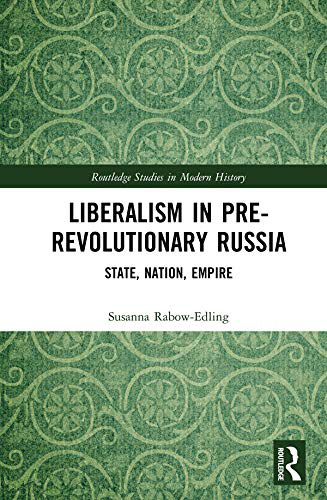
The author writes: “In chapter 5, I focus on one of the leading Kadets, Peter Struve, who combined the liberal nationalism of the reform period with the contemporary ideology of liberal imperialism. Struve’s liberalism then contrasted with that of another Kadet leader, Pavel Miliukov, to show how nationalism and imperialism were manifest in both versions of liberalism, although in different ways.
“They both called for liberty, equality, social justice, the rule of law, representative government, individual rights and universal suffrage, but held divergent views on Russia’s minorities. While Struve advocated cultural assimilation, Miliukov championed the rights of national minorities. Yet, both thinkers wished to preserve the integrity of the imperial state and thus tried to reconcile liberalism with imperialism.” The endnotes to chapter 1 constitute an excellent bibliography on Russian classical liberalism.
Radishchev, Alexander. Journey from St. Petersburg to Moscow. Translated by Andrew Kahn and Irina Reyfman. Columbia University Press, 2020.
Kahn and Reyfman write: “In its full form, [Radishchev’s iambic ode ‘Liberty’] discusses the social contract and the right it gives the sovereign people to protest against a corrupt monarch. Radishchev’s examples of champions of liberty include Cromwell against the Crown and for the American colonies, Washington’s revolt against the British Empire. ...
“Radishchev was one of the first – if not the first – proponents of individual rights in Russia, a position based on his extensive reading of natural law theorists who argued for the equality of all in the state of nature. ... Radishchev’s opposed serfdom.”
Radishchev was influenced by Grotius, Adam Smith, and Condorcet. Helen Stuhr-Rommereim writes: “While Alexander Radishchev’s 1790 Journey from St. Petersburg to Moscow is ostensibly traveler’s notes from the 450-or-so miles between the two resplendent centers of the late eighteenth-century Russian Empire, it is not a compilation of ethnographic observations. Instead, readers travel through a highly crafted reflection on the Enlightenment ideals of equality, justice, and progress. The most famous work by a career civil servant who also wrote poetry, nonfiction, and philosophy, the sui generis Journey collages together monologues from fellow travelers, found texts describing utopian social reform, and surreal dream visions to indict Russian society under the rule of Catherine the Great – especially for its reliance on the labor of enserfed peasants. The brazen text earned its author a death sentence, later commuted to exile for life.”
Riha, Thomas. A Russian European: Paul Miliukov in Russian Politics. University of Notre Dame Press, 1969.
A biography of Miliukov (also transliterated as Pavel Milyukov), a historian and the political leader of the Constitutional Democratic Party (Kadets), the short-lived early twentieth-century Russian classical-liberal party. The book was originally the author’s Ph.D. dissertation at Harvard, done under the supervision of Richard Pipes.
Paul Avrich writes: “Miliukov has aptly been called the ‘soul and brain’ of Russian liberalism. But he was also the symbol of its failure. ... To Miliukov – foreign minister in the [1917] Provisional Government – it was unthinkable for Russia to betray her democratic allies by concluding a separate peace with Germany. With singular blindness to the facts, he was confident that the overthrow of the autocracy had strengthened Russia’s resolve to prosecute the war. He continued to press for a military victory and to preach the conquest of the Straits, for which the [Social Revolutionary] leader Victor Chernov bitterly dubbed him ‘Miliukov-Dardanelsky.’ In a lame effort to justify his position, Miliukov insisted that the acquisition of the Straits ‘represents the completion of the state’s organic growth and not the initiation of “imperialism.”’ ... Russian liberalism, as [Miliukov] himself noted, was ‘not bourgeois but intellectual.’ The liberals, lacking a solid middle class on which to rely for support, were forced to seek an alliance with the [tsarist] government or with the [socialist] revolutionaries, but neither would meet them half way. As a result, they remained an isolated group unable to alter the political course on which the country was embarked.”
Rosenberg, William G. Liberals in the Russian Revolution: The Constitutional Democratic Party, 1917–1921. Princeton University Press, 1974.
Rosenberg unfortunately thinks the classical-liberal Kadets – though influenced by Auguste Comte – were insufficiently egalitarian, and Rosenberg thinks that the Bolsheviks deserved to win. Nonetheless he is a serious historian, and he takes the Kadets seriously. Rosenberg writes: “The present book focuses on the group many Russians thought would lead their country through the revolution and into the ranks of Western European democracies, the Constitutional Democrats, or Kadets.
“As political history, it examines the values, programs, organization, and tactics of Russia’s most prominent [classical] liberal party at the time of its greatest crisis. As a study of the Russian revolution and civil war, it probes the strengths and weaknesses of the one political group whose policies did more to influence the outcome of events than any other political organization besides the Bolsheviks. ...
“Venerating legal principles and a rule of law, holding individual civil liberties as precious values in themselves, seeking political democracy in the main, rather than social democracy or class leveling, Kadets represented in Russia what can generally be regarded as basic European liberal traditions.”
Rosenberg also writes: “[The March 1917 Provisional Government Kadet minister of agriculture Andrei Shingarev’s] concern was not for measures which would satisfy the peasants’ demand for land but for improving the [immediate wartime] food supply.” This meant as little disruption as possible of land holdings. As part of the Provisional Government, the Kadets also opposed calls for immediate peace and were committed to continued prosecution of the war against the Central Powers.
Rumer, Eugene, and Richard Sokolsky. Grand Illusions: The Impactof Misperceptions about Russia on U.S. Policy. Carnegie Endowment for International Peace, 2021. [Download PDF]
The authors write: “Three factors largely account for [U.S. policymakers’ misconceptions about Russian capabilities and intentions]. ... The first factor is the lingering euphoria of the post–Cold War period. For many Western observers, the collapse of the Soviet Union and the implosion of Russian power demonstrated the permanent superiority of the United States. The perception that Russia’s decline was so deep and irreversible that it would no longer be able to resist Western initiatives made it difficult to accept Moscow’s pushback against Western policies.
“This was a particular problem when the North Atlantic Treaty Organization (NATO) pursued several rounds of enlargement in the 1990s and early 2000s under U.S. leadership. U.S. leaders ignored Russia’s objections and underestimated the lengths to which Russian counterparts were prepared to go to secure the homeland against perceived threats.
“Second, American policymakers and experts have long paid too little attention to the drivers of Russia’s external behavior. Russian threat perceptions are part of an inheritance heavily shaped by geography and a history of troubled relations with other major European powers. ...
“Third, U.S. policymakers have not fully internalized the lessons of the two biggest crises of the Cold War—the Cuban missile crisis of 1962 and the Euromissile crisis of the early 1980s. ... In both situations, U.S. missiles deployed in Europe would deny the Kremlin the advantage of strategic depth and decision time in a crisis. The lessons of those crises were ignored as anachronisms when NATO embarked on its eastward expansion on the assumption that [Russia] would no longer need to worry about, let alone maintain the necessary capabilities for the territorial defense mission. ... When Russia proved otherwise, the [NATO] alliance was caught by surprise.”
Sarotte, M. E. Not One Inch: America, Russia, and the Making of the Post–Cold War Stalemate. Yale University Press, 2021.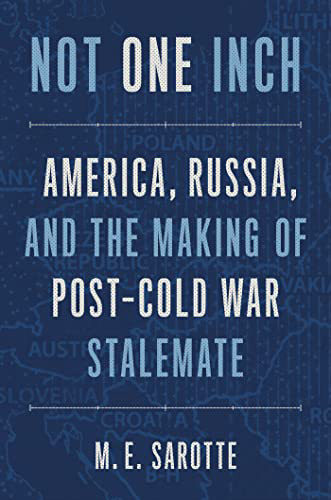
Stephen Kotkin writes: “[M. E. Sarotte’s] engaging book ... draws its title from a conversation between Baker and Gorbachev on February 9, 1990, about German unification, and superficially appears to corroborate Putin’s case. ‘Baker uttered the words as a hypothetical bargain,’ Sarotte recounts. ‘What if you let your part of Germany go, and we agree that NATO will “not shift one inch eastward from its present position?”’ ... Sarotte [shows] a parade of Western officials suggesting, for a brief moment, limits on NATO enlargement. Despite its title, however, these vague vows are not the book’s subject. ... What preoccupies Sarotte is the parallel [Western] effort to consolidate Russia’s [post-communist government] and its interaction with NATO expansion.” This effort fell apart for several reasons, including Russia’s war in Chechnya and Bill Clinton’s use of NATO expansion to energize American voters of East European descent as part of his reelection campaign.
“‘One of the president’s political advisers, Dick Morris, conducted a poll on NATO enlargement, which showed the public opposed to postponing it,’ Sarotte writes. ‘Clinton was too good a politician to forget that 20 million Americans of Eastern European descent lived in fourteen states that accounted for close to 40 percent of the Electoral College.’”
Satter, David. Never Speak to Strangers and Other Writing from Russia and the Soviet Union. Ibidem Press, 2020.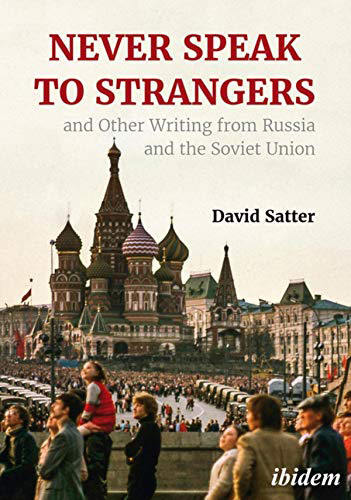
Satter was a journalist in Russia, 1979–2019. This volume collects his fascinating reportage. A few examples: His visit in Soviet times to his family’s ancestral town in Ukraine; his prediction in 1988 that glasnost and perestroika wouldn’t work; and corrupt privatization, political rule by decree, and the rise of criminals under Yeltsin.
Here are two brief excerpts: “The reformers believed that regardless of how the first capitalists acquired their wealth, they would, once they had amassed their capital, begin to behave like rational economic actors and demand the protections of a state based on law. In practice, however, ... Russia was left with an economy which had no place for the rule of law because its operating principle was not productivity but theft. ...
“The key to Russia’s sense of exceptionalism is a belief in the quasi-divine status of the Russian state. It is a notion that is responsible for the absence of the rule of law in Russia and the low value that is attached to human life. ... With the collapse of Communism, Russia did not succeed in finding a new national ideology. Putin, however, promoted the idea that the purpose of Russian history was the creation of a strong state regardless of ideology.”
Satter, David. The Less You Know, the Better You Sleep: Russia’s Road to Terror and Dictatorship under Yeltsin and Putin. Yale University Press, 2017.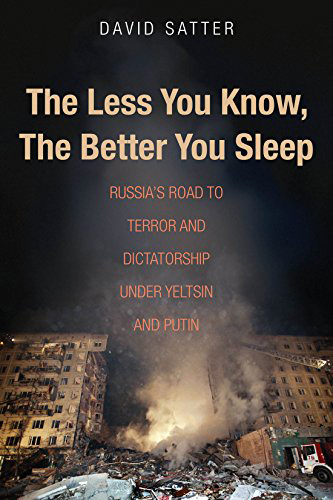
Excellent opening chapter on the 1999 apartment bombings. Satter writes: “To the extent that there is evidence as to the perpetrators, it points not to Chechen terrorists but to Kremlin leadership and the FSB [Federal Security Service].”
Shleifer, Andrei, and Daniel Treisman. “A Normal Country: Russia after Communism.” Journal of Economic Perspectives 19, no. 1 (Winter 2005): 151–74. [Download PDF]
The authors argue that “by the late 1990s Russia had become a typical middle-income capitalist democracy.”
Sholokhov, Mikhail. Virgin Soil Upturned, 2 vols. Translated by R. C. Daglish, University Press of the Pacific, 2000.
A Stalinist socialist-realist novel set in Ukraine during forced collectivization and the terror-famine. Gary Saul Morson and Morton Schapiro write: “Much Soviet literature celebrates violence against class enemies. When one of Mikhail Sholokhov’s characters can’t bring himself to take food from starving Ukrainian peasant children, the novel’s model hero expresses rage: ‘You’re sorry for them. . . . You feel pity for them? And have they had any pity on us?’ Another echoes this sentiment: ‘You could line up thousands of old men, women and children, and tell me they’ve got to be crushed . . . for the sake of the revolution, and I’d shoot them all down with a machine-gun.’”
Shore, Marci. The Ukrainian Night: An Intimate History of Revolution. Yale University Press, 2018.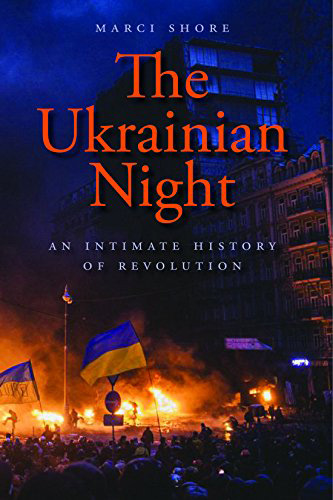
The Ukrainian Night provides an account of the last days of Ukrainian president Viktor Yanukovych’s time in office.
Elliot Dolan-Evans, in the Journal of Soviet and Post-Soviet Politics and Society, writes: “The Ukrainian Night is an engrossing study of key perspectives on the Maidan protests from 2013 to 2014 and presents a lived experience of these tumultuous and uncertain days for Ukrainian society.”
Short, Philip. Putin. Henry Holt, 2022.
Peter Baker writes: "[T]he British journalist Philip Short, with his expansive new biography, Putin, ... sees the rift between East and West largely through the eyes of its protagonist. ...
"Short, a former journalist with the BBC, The Economist and The Times of London, adds to the library of insightful books about the Russian autocrat. ... 'The purpose of this book is neither to demonize Putin — he is more than capable of doing that himself — nor to absolve him of his crimes,' Short writes, 'but to explore his personality, to understand what motivates him and how he has become the leader that he is.'
"Short’s book is no hagiography. He extensively covers the dark moments of Putin’s career — [the gruesome poisoning of Alexander Litvinenko in London,] the leveling of Grozny during the second Chechen war, the reckless handling of the Moscow theater siege, the cynical exploitation of the terrorist attack on a school in Beslan to consolidate power, the crackdown on dissent at home, including the poisoning and imprisonment of Alexei A. Navalny. ...
"[Short] equates Putin’s forcible annexation of Crimea to Western support for Kosovo’s independence, dismissing differences between the two as 'nuances.' Indeed, Kosovo is one of 'the West’s three cardinal sins' in Putin’s eyes 'that had destroyed both sides’ hopes of building a better, more peaceful world after the collapse of the Soviet Union' (along with withdrawing from the Antiballistic Missile treaty and expanding NATO). Every Russian outrage is likened to some Western perfidy. Yes, the Russians interfered in the 2016 election but 'the United States had done the same.' The deterioration in relations had a certain 'inevitability' that was 'largely the result of a series of Western, essentially American, decisions.'
"Short advances the Russian argument that America betrayed a 'promise' by Secretary of State James A. Baker III in 1990 that NATO jurisdiction would not move 'one inch to the east.' ... By contrast, Short makes no mention of an actual promise Russia made in a 1994 agreement guaranteeing Ukraine’s sovereignty and forswearing the use of force against it, an accord Putin has obviously broken.
"Indeed, Short accepts Putin’s explanation for his unprovoked invasion of Ukraine. 'The State Department,' he writes, 'insisted that the war had nothing to do with NATO enlargement and everything to do with Putin’s refusal to accept Ukraine’s existence as an independent state, which may have been good spin but was poor history.' Unless you read Putin’s own 5,000-word poor history published last year refusing to accept Ukraine’s existence as an independent state or remember that the invasion took place many, many years after the main NATO expansion and at a time when NATO membership for Ukraine was not seriously on the table."
Slade, Stephanie. “If Ukraine Wants To Stand for Liberty and Democracy, It Should Rethink Some of Its Wartime Policies.” Reason, July 19, 2022.
The author writes: “There can be no question that the actions of Russia under Vladimir Putin put the country on the side of autocracy and repression. But the West should be clear-eyed about the ways that Ukraine is, and isn't, living up to its end of the democracy-and-liberty formulation. ...
“With the declaration of martial law in February came a prohibition on male citizens aged 18–60 leaving the country. Then in March, the government combined the country's national TV stations into a single state-approved broadcast and suspended 11 opposition political parties it described as ‘pro-Russian.’ ...
“When Putin in March signed a law making it a crime to disseminate ‘deliberately misleading information’ or to discredit Russian military operations, the U.N.'s High Commissioner on Human Rights was aghast. A statement released by that office said the Russian law ‘depriv[ed] the population of their right to access diverse news and views at this critical time.’ Russia under Putin does indeed have a lamentable history of censorship, state-backed disinformation campaigns, and persecution of dissidents. But if the Russian people have a right to a diversity of perspectives, surely the Ukrainian people do too.”
Smith, Christopher M. Ukraine’s Revolt, Russia’s Revenge. Brookings Institution Press, 2022.
Smith is a career Foreign Service Officer who was posted at the U.S. Embassy in Kiev from 2012 to 2014. Thus, he witnessed the Maidan Revolution, the Russian seizure of Crimea, and the Russian-aided secession of the Donbas. This book is a detailed, blow-by-blow narrative of events based on the email archive of the embassy. He thoroughly covers Russian disinformation and stealthy military moves. The book is occasionally peppered with insights about the pervasive corruption in Ukraine. Here is one example:
“’[Education Minister Dymytro] Tabachnyk has a brother who runs the criminal side of things,’ [a] visitor to the Embassy told us. ‘While Minister Tabachnyk is the upright public face of the operation, his brother runs a shadow operation that sucks money from the Ministry of Education. Textbook procurement, shady privatization of ministry assets, and diploma sales are probably the most profitable for them right now.’”
Smith is a moralist in his rhetoric on foreign relations: “I am paid by my government to do the right thing” and “For those who believe in human dignity, America remains the indispensable nation.” But he acknowledges that Ukrainian leaders doubtless grew tired of endless “moralizing lectures from Western leaders.” He acknowledges the actuality of geopolitics. He says that Ukrainian leaders had to answer the question: “Can Ukraine prosper and advance ... by balancing on the fulcrum of European geopolitics, pursuing its advantage by shifting its weight from one side to the other, or must it seat itself firmly on one side?”
But in truth, he disdains Realpolitik. He says that the “notion of ‘geopolitics’ is un-American at its core.” Instead, he says America’s “world leadership” is based on its “values-based” foreign policy. Such a foreign policy has allowed the U.S. government “a unique chance to shape the world.” The U.S. has remained powerful by “fulfilling our moral duties.”
Smith’s main purpose is to argue against the claim that the U.S. Embassy was the “decisive force” behind the Euromaidan protest movement or played a “pivotal role” in creating or supporting it. The U.S. did not publicly advocate the ouster of President Viktor Yanukovyk. The U.S. diplomats (including the author) were surprised by the popular uprising that overthrew him and had expected that Ukraine’s future path would be “hashed out in the economic and diplomatic space.” But the book does not cover any activity in Ukraine of the U.S. Central Intelligence Agency, other than to mention government-to-government sharing of intelligence.
Smith acknowledges that a principal aim of U.S. actions was to ensure that Ukraine had a European orientation. The U.S. said frankly that it wanted to see adhesion to the EU “cement a European future” for Ukraine. What had set off the Euromaiden protest was Yanukovyk’s balking at adhering to the EU.
Snyder, Timothy. Bloodlands: Europe between Hitler and Stalin. Basic Books, 2012.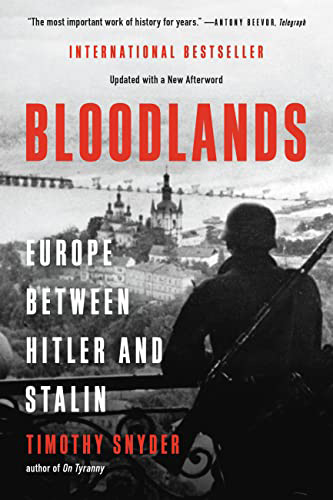
This book is about the 14 million civilians killed outside of war in what Timothy Synder calls “political mass murder” in Poland, western Russia, Ukraine, Belarus, and the Baltic states between 1933 and 1945. About Stalin’s terror-famine in the Ukraine, Snyder writes: “The basic facts of mass hunger and death, although sometimes reported in the European and American press, never took on the clarity of an undisputed event. Almost no one claimed that Stalin meant to starve Ukrainians to death; even Adolf Hitler preferred to blame the Marxist system. It was controversial to note that starvation was taking place at all. Gareth Jones did so in a handful of newspaper articles; it seems that he was the only one to do so in English under his own name. ... Though the journalists knew less than the diplomats, most of them understood that millions were dying from hunger. ... Aside from Jones, the only journalist to file serious reports in English was Malcolm Muggeridge, writing anonymously for the Manchester Guardian. He wrote that the famine was “one of the most monstrous crimes in history, so terrible that people in the future will scarcely be able to believe that it happened.”
Snyder, Timothy. “Putin’s Denial of Ukrainian Statehood Carries Dark Historical Echoes.” Financial Times, February 22, 2022.
The author, a professor of history at Yale University, writes: “Putin made [the claim] last July [2021] in a long essay: there is no Ukraine; no Ukrainians; it is all just part of Russia, or invented by Russia, therefore to be claimed and controlled and, if necessary, annihilated by Russia. ...
“Putin thinks that everyone who speaks Russian must be a Russian, and needs his protection. Pretty much everyone in Ukraine does speak Russian. ... There is a deeper issue here. Whatever language we speak, it is what we say that matters. Our identity is not to be decided by distant tyrants, whatever language they might speak.”
Snyder, Timothy. The Road to Unfreedom: Russia, Europe, America. Tim Duggan Books, 2019.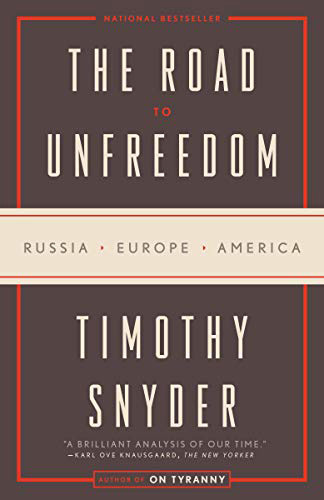
Tim Adams in his review for the Guardian writes: “Timothy Snyder begins his pattern-making deconstruction of recent Russian history ... with a comprehensive account of Putin’s reverence for the work of [Ivan] Ilyin (Russian philosopher). Like much of Snyder’s analysis in this unignorable book, the framing offers both a disturbing and persuasive insight. ...
“To establish that dystopian state, Snyder argues, Putin’s regime has deliberately pursued two of Ilyin’s central concepts. The first demanded the identification and destruction of the enemies of that Russian spirit to establish unity; alien influences – Muslim or Jewish, fundamentalist or cosmopolitan – were intent on ‘sodomising’ Russian virtue (sexual imagery is never far away in the Kremlin’s lurid calls to arms). If those enemies did not exist they would have to be invented or exaggerated.”
Snyder writes about Putin’s revival of the concept of “Novorossiia”: “1774 ... was when the Russian Empire defeated the Ottoman Empire and annexed territories on the north shore of the Black Sea, some of which are now part of Ukraine. These territories were known in the eighteenth century as ‘Novorossiia,’ or New Russia. ... In the logic of ‘Novorossiia,’ Ukraine was the aggressor because it included territories that were once called Russian and therefore were eternally Russian.”
Solchanyk, Roman. “Ukraine, Russia, and the CIS.” Harvard Ukrainian Studies 20 (1996): 19–43. [Download PDF]
Leo Krasnozhon calls this article “a great introduction to the first post-Soviet conflict between Russia and Ukraine.”
Solchanyk writes: “[Ukrainian President Leonid Kuchma’s top national security adviser, Volodymyr Horbulin said]: ‘I often recall what former U.S. Secretary of State Henry Kissinger told me: “I never met a single Russian who thought that Ukraine could be independent.”’ Kuchma was more forthright, saying that ‘in Russia they pretend that Ukraine as a sovereign, independent state does not exist.’ ‘As I see it,’ he continued, ‘in Russia, the stereotype of viewing Ukraine as its constituent part or, at any rate, as the sphere of its prevailing influence has not yet been eliminated.’ ...
“[Len Karpinskii, then chief editor of Moskovskie Novosti, asserted] ‘Millions of Russians ... are convinced that without Ukraine not only can there be no great Russia, but there cannot be any kind of Russia at all.’ This perception emphasizes the degree to which Ukraine is not only and not simply a problem for Russia, but, more importantly, that it is also a problem of Russia. The defining characteristic of the Ukrainian-Russian ‘divorce syndrome’ is that when Ukraine declared its independence in August 1991, it initiated divorce proceedings not only against the USSR, but also against what many Russians perceived to be ‘Russia.’ As Roman Szporluk has pointed out, in imperial Russia Ukrainians (and Belarusians) were viewed as component parts of a greater Russian nation, and what sets them apart from all of the other non-Russians of the former Soviet Union is that many Russians question their very existence.
“Today, a large segment of the Russian population, and certainly much of Russia’s political class as well as its cultural elites, still continues to view Ukraine as an integral part of Russia and Ukrainians as an organic part of the Russian nation. ... The same sentiment was voiced by [Russian President Boris] Yeltsin in an address to his countrymen in November of [1997]: ‘It is impossible to tear from our hearts that Ukrainians are our own people. That is our destiny – our common destiny.’”
Sorokin, Vladimir. Day of the Oprichnik: A Novel. Translated by Jamey Gambrell. Reprint ed. Farrar, Straus and Giroux, 2012.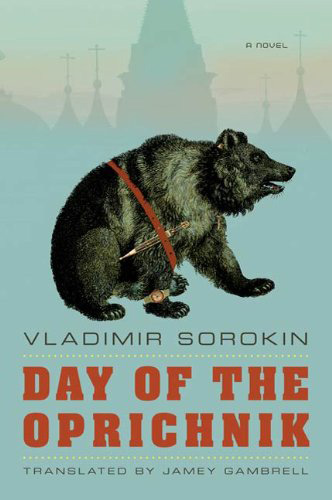
Day of the Oprichnik is a dystopian novel following a secret policeman in a near-future Russia where the old codes of Ivan the Terrible are restored. Stephen Kotkin’s review reads, “Sorokin’s pyrotechnics are often craftily twinned with Soviet-era references and conventions. The title and 24-hour frame of Day of the Oprichnik shout to mind Solzhenitsyn’s One Day in the Life of Ivan Denisovich (1962), an exposé of a Gulag camp that depicts an Everyman-victim who finds dignity in labor, almost like a Socialist Realist hero. But whereas Solzhenitsyn’s masterpiece unintentionally demonstrated the deep impact that Soviet tropes had had on its author, Sorokin’s comic turn deliberately shows how Soviet and even Old Muscovy mentalities persist.”
Matthew Janney writes: “Sorokin is known as Russia’s literary provocateur-in-chief. The recipient of the Russian Booker and Andrei Bely prizes, he has ... had his books thrown [in 2002] into a huge [mock] cardboard toilet outside the Bolshoi Theatre by a pro-Kremlin youth group.” Guy Chazan adds: “[Day of the Oprichnik] describes a high-tech future fused with feudal barbarity, written in a bizarre archaic language with hypermodern inflections. The book might be satirical, but its message is deadly serious: Russia’s chronic tendency to embrace autocratic rule.”
Stockdale, Melissa Kirschke. Paul Miliukov and the Quest for a Liberal Russia, 1880–1918. Cornell University Press, 1996.
Miliukov was a prominent historian and the political leader of the classical-liberal Constitutional Democratic Party (or Kadet party). After the Revolution of 1905, the Kadets became the largest political party in Russia. Later, in 1917, Miliukov was the pro-war foreign minister in the short-lived Provisional Government between the abdication of the tsar and the Bolshevik Revolution.
Miliukov was influenced by Auguste Comte’s positivism and by the New Liberalism (1905–1914) of people like Lloyd George (whom thoroughgoing liberal Herbert Spencer called the New Tories). Miliukov rejected the “social contract” concept and Locke’s idea of natural rights that preceded and constrained politically organized society. Stockdale writes: “Miliukov respected classical liberalism’s espousal of individual rights and political liberty, but found these liberal touchstones insufficient. ... [The interventionist] state had necessary social and economic tasks to perform that laissez-faire doctrines and natural law theory could ill accommodate.”
Subtelny, Orest. The History of Ukraine. 4th ed. Toronto: University of Toronto Press, 2009. [Download PDF]
In reviewing the first edition, Frances A. Swyripa writes: “Within the limits imposed by an encyclopedic survey, Subtelny has made use of the latest research ... to furnish a balanced and comprehensive account of developments in Ukrainian history. ... For example, Subtelny indicates how the Communist party of the Soviet Union ... used the Pereiaslav Agreement, signed by Bohdan Khmelnytsky with Tsar Aleksei after the great uprising of 1648, to justify Soviet domination of Ukraine. ... Subtelny insists upon, and convincingly demonstrates, the distinctiveness of the Ukrainian experience and the legitimacy of Ukrainian history.”
Szporluk, Roman. “After Empire: What?” Daedalus 123, no. 3 (Summer 1994): 21–39. Reprinted in Roman Szporluk, Russia, Ukraine, and the Breakup of the Soviet Union. Hoover Institution Press, 2000.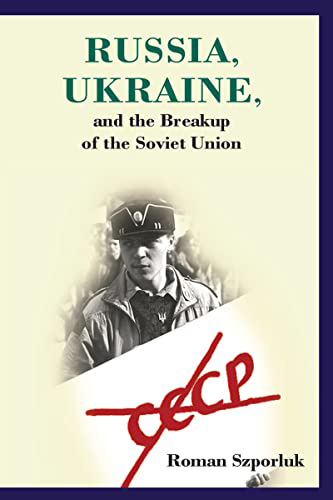
Szporluk, professor of Ukrainian history at Harvard, reminds us that in analyzing the Revolution of 1848, Marx and Engels contended in Hegelian fashion that there were historic and a nonhistoric people and progressive and reactionary nationalisms. Marx and Engels viewed Russians as barbaric and Ukrainians as nonhistoric peoples who should become Poles (who Marx thought were a people who had revolutionary potential and could serve as a bulwark against the Russians).
Szporluk, Roman. “Ukraine and Russia.” In The Last Empire: Nationality and the Soviet Future, 151–82. Edited by Robert Conquest. Hoover Institution Press, 1986.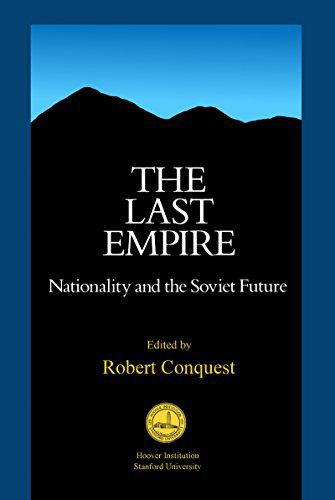
The author alludes to the thesis set forth by, among others, the Russian classical-liberal historians Paul Miliukov and Boris Chicherin, that in the West society generated the state whereas in Russia the state generated society. He writes: “Russian social and political thought contains a theme that poses Russia in opposition to the West. One of the differences supposedly separating the two worlds was the alleged creative role of the state as a force standing above society in Russia, as contrasted to the state’s subordination to society in Europe. This is one of the ways in which both Russians and non-Russians have tried to explain the phenomenon of autocracy in Russian history.
“Whatever the merits of those interpretations (and ... there is some validity to them), such problems do not exist in Ukrainian history: there is no ‘Ivan the Terrible Complex’ (to cite the title of Alexander Yanov’s study) in Ukrainian history. On the contrary, Ukrainian national mythology idealized the epoch of the Cossacks as a period of freedom and a time of the supremacy of society over the state.” ...
“Mykola Kostomarov (1817–1885) ... wrote:
“‘The Ukrainians are characterized by individualism, the Great Russians by collectivism. ... In the political sphere, the Ukrainians were able to create among themselves free forms of society which were controlled no more than was required for their very existence. And yet they were strong in themselves without infringing on personal liberties. The Great Russians attempted to build on a firm foundation a collective structure permeated by one spirit. The striving of the Ukrainians was toward federation, that of the Great Russians towards autocracy and a firm monarchy.’”
Taylor, Sally J. “A Blanket of Silence: The Response of the Western Press Corps in Moscow to the Ukraine Famine of 1932–33.” In Famine-Genocide in Ukraine, 1932–1933: Western Archives, Testimonies and New Research. Edited by Wsevolod W. Isajiw. Ukrainian Canadian Research and Documentation Centre, 2003.
Sally Taylor writes: “The only person who had actually defied the [travel] ban was the implacable Malcolm Muggeridge, who broke a story he discovered most people didn’t want to hear about – one which proved to be the signal event of his life. ...
“[I]n what were clearly uncensored stories, [William Henry Chamberlin] published a series of five hard-hitting and thorough articles in The Manchester Guardian, describing in detail what he had seen in the Soviet countryside. They were a logical follow-up to Muggeridge’s dispatches written seven months before. ...
“Like Muggeridge, Chamberlin would find the famine the turning point in his life and he returned to the United States a hard-line right-wing conservative. ...
“The Ukrainian Famine of 1932–33 remains the greatest man-made disaster every recorded, exceeding in scale even the Jewish Holocaust of the next decade. It was Walter Duranty’s destiny to become the symbol for the West’s failure to recognize and understand it at the time.
“When all is said and done, he alone, of all the witnesses to the terrible events, had sufficient prestige and prominence to exert an influence. ... Had Duranty, a Pulitzer Prize–winner at the peak of his celebrity, spoken out loud and clear in the pages of The New York Times, the world could not have ignored him as it did Muggeridge and [Gareth] Jones and events may have, conceivably, taken a different turn. If Duranty had taken a stand, he might now be considered one of the century’s great, uncompromising reporters. But he did not.
“When it came to discretion and expedience, the Western establishment that feted him, no less so than the Kremlin, had found their man.”
Taylor, Sally J. Stalin’s Apologist: Walter Duranty, The New York Times’s Man in Moscow. Oxford University Press, 1990.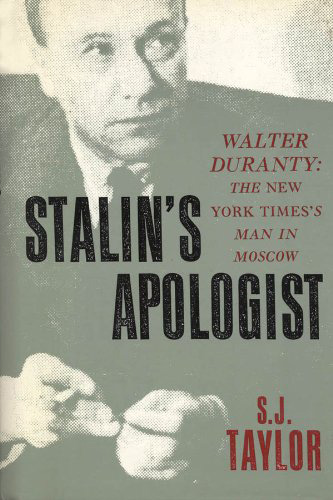
Complete and thorough treatment of this shameful episode in the annals of prestige-press journalism. Most relevant for our purposes are chapter 9, “A Blanket of Silence” and chapter 10, “The ‘Famine’ Is Mostly Bunk.”
Tomenko, Mykola. “The Liberal Idea in Ukraine.” In Ukrainian Statehood in the Twentieth Century: Historical and Political Analysis, 71–81. Edited by Oleksandr Dergachov. Political Thought, 1996.
The author argues that while classical-liberal rhetoric can be found in Ukraine today, that this is mostly a matter of post-Communist fashion and a desire to please donors from international agencies. For example, a liberal faction in the Ukrainian Rada is really social democratic, not classical-liberal in a thoroughgoing way. The article includes a history of classical liberalism in Ukraine.
Tooze, Adam. Crashed: How a Decade of Financial Crisis Changed the World. Viking, 2019.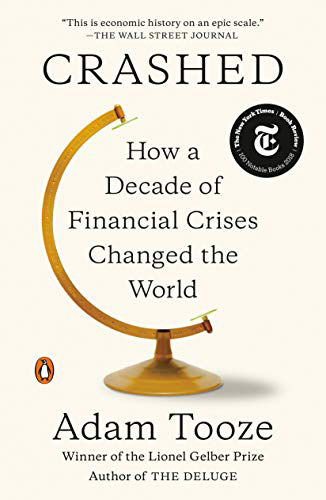
Economist and historian Jeffrey R. Hummel writes: “Tooze is a left-leaning historian whose understanding of economics is fairly sophisticated. He covers how the financial crises affected subsequent political events in Europe as well as the U.S. In doing so, he ties in Putin’s initial invasion of Georgia and his reaction to the Maidan protests [2013–2014]. Although it is only a part of an over 700-page book, he depicts a strategic Putin, as opposed to the crazy Putin you get in Timothy Snyder’s The Road to Unfreedom. I disagree with many of Tooze’s preferred economic policies, but he does an excellent job of tying together economic events in Europe, Russia, and even China with those in the U.S., something I’ve not seen done as well anywhere else.”
Trachtenberg, Marc. “The United States and the NATO Non-Extension Assurances of 1990: New Light on an Old Problem?.” International Security 45, no. 3 (Winter 2020-2021): 162–203.
Here is an excerpt from the abstract: "The Russian government has claimed that the Western powers promised at the end of the Cold War not to expand NATO, but later reneged on that promise. Most former officials in the West, and many scholars as well, have denied that this was the case; but other scholars, along with a handful of former officials, believe that promises to that effect were, in fact, made in 1990. ... An examination of the debate in light of the evidence—especially evidence that the participants themselves have presented—leads to the conclusion that the Russian allegations are by no means baseless. ..."
Carpenter, Ted Galen. Unreliable Watchdog: The News Media and U.S. Foreign Policy. Cato Institute, 2022.
The author writes in an excellent chapter on U.S.-Russia relations: “Perhaps the most prominent issue the news media has covered in recent years is Russia’s conduct toward the United States. Three features of that coverage are striking and more than a little alarming. One is the pervasiveness and virulence of the hostility directed against nearly every facet of Moscow’s policies. A second feature is the willingness of the mainstream media ot collaborate with current and former members of the U.S. intelligence community, as well as the Democratic party, to push the narrative that Russia poses an existential threat to the United States and world peace. Third, this tripartite alliance has fostered a surge of neo-McCarthyism, which insists that gullible or disloyal Americans – including dissident members of the press – are aiding and that cause, especially the Kremlin’s agenda to undermine America’s political system. ... [this toxic brew has] poisoned public discourse in a way that inflicts serious damage on America’s democratic system.” One interesting feature of the chapter’s treatment of Trump impeachment trial triggered by Trump’s telephone call with Ukrainian president Zelensky is how little the testimony emphasized a possible quid pro quo and how much it emphasized U.S.-Ukrainian strategic relations.”
The book also covers the Vietnam war, the Gulf war, the Balkan wars, the Iraq war, and relations with China.
Veidlinger, Jeffrey. In the Midst of Civilized Europe: The Pogroms of 1918–1921 and the Onset of the Holocaust. Macmillan, 2021.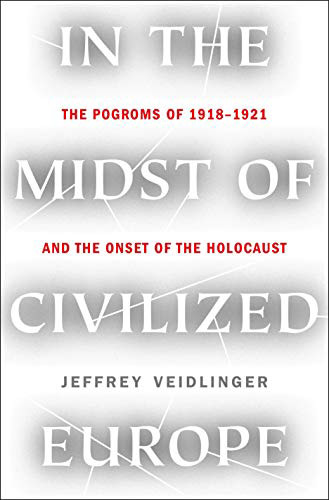
Veidlinger writes: “Between November 1918 and March 1921, during the civil war [between the Whites and Reds] that followed the Great War, over one thousand anti-Jewish riots and military actions – both of which were commonly referred to as pogroms – were documented in about five hundred different locales throughout what is now Ukraine,” an area fought over by Russians, Poles, and Ukrainians, demobilized soldiers, local warlords and civilians. Forty thousand Jews were killed during these pogroms, Veidlinger writes, and another 70,000 “subsequently perished from their wounds, or from disease, starvation, and exposure as a direct result of the attacks.” Approximately 600,000 Jewish refugees fled abroad, and “millions more were displaced internally.”
The civil war “led to the loss of about one million people in Ukraine through famine, disease, and military violence ... Between 1914 and 1921, Ukraine lost nearly 20 percent of its total population.” Jews were not the only ethnic or religious group that suffered, Veidlinger writes, “but Jewish civilians alone were singled out for persecution by virtually everyone.”
Timothy Snyder adds: “The mass killings of Jews from 1918 to 1921 are a bridge between local pogroms and the extermination of the Holocaust. No history of that Jewish catastrophe comes close to the virtuosity of research, clarity of prose, and power of analysis of this extraordinary book. As the horror of events yields to empathetic understanding, the reader is grateful to Veidlinger for reminding us what history can do.”
Von Laue, Theodore H. Sergei Witte and the Industrialization of Russia. MacMillan, 1963.
Sergei Witte was tsarist Russia’s minister of finance at the turn of the twentieth century. He was an explicit follower of the economic nationalist Friedrich List. Witte favored industrializing undeveloped Russia not organically through market processes, but rather via state guidance and the artificial creation of manufacturing. He increased taxation, retained protective tariffs, and enlarged the public debt. He emphasized growth in the transportation grid and in heavy industry. He erected public works. Von Laue calls Witte “the great precursor of Stalinist industrialization.”
One of Witte’s critics, P. P. Migulin, argued that private enterprise in Russia needed to be liberated from the tutelage of the government. Migulin condemned Witte as a “true pillar of the bureaucracy” and said he had crippled private economic initiative. Migulin acknowledged that government had long interfered with industry in Russia, but Witte, Migulin maintained, had carried that interference to an extreme. Von Laue writes that Witte substituted “state activity for private initiative.” He made Russian businessmen “servants of the state.”
Von Laue writes about Witte critic and classical-liberal I. Kh. Ozerov: “One aspect worth stressing ... was Ozerov’s denunciation of the tariff. While it benefited a few industries, he contended, the bulk of Russian enterprise was shielded from the necessity of improving its operations; the tariff thus slowed down or stifled industrial growth. ...The tariff also encouraged trusts and syndicates and kept badly needed manufactured goods out of the reach of the villages. Let it be lowered by all means.”
Walicki, Andrzej. Legal Philosophies of Russian Liberalism. University of Notre Dame Press, 1992.
The author writes about so-called Old Liberalism [i.e., thoroughgoing classical liberalism]: “External freedom, [Russian classical liberal Boris Chicherin] argued, is an indispensable condition of the higher freedom [of Hegel] and therefore it should never be renounced for moral or other reasons. ... [I]f the higher freedom is absolutized at the expense of the lower, the entire structure breaks down, as the case of Fichte demonstrates.
“The higher, moral freedom is the freedom of the good; morality, however, cannot be institutionalized by force, therefore, the freedom of the evil, within, certain limits, must likewise be permitted and protected. Morally neutral, external freedom – freedom to be either moral or immoral – is a precondition of freedom as self-determination and self-perfection. ... The law therefore, deals with the sphere of extremal freedom, with freedom in the Lockean sense not with the higher freedom of Hegel. ...
“[Chicherin] repeatedly stressed that ‘individualism is human freedom,’ that it is inseparable from the free, rational personality and that the struggle against it, if successful, can only result in degrading human life to the level of animal existence. That Hegel would not have subscribed to this apologia for individualistic freedom Chicherin was well aware.”
Walt, Stephen M. “An International Relations Theory Guide to the War in Ukraine.” Foreign Policy, March 8, 2022.
Walt writes: “For realists, Russia’s invasion of Ukraine ... reminds us that great powers sometimes act in terrible and foolish ways when they believe their core security interests are at stake. That lesson doesn’t justify such behavior, but realists recognize that moral condemnation alone won’t prevent it. A more convincing demonstration of the relevance of hard power – especially military power – is hard to imagine. ...
“Regrettably, the war also illustrates another classic realist concept: the idea of a ‘security dilemma.’ The dilemma arises because the steps that one state takes to make itself more secure often make others less secure. State A feels unsafe and seeks an ally or buys some more weapons; State B gets alarmed by this step and responds in kind, suspicions deepen, and both countries end up poorer and less safe than they were before.”
Yanov, Alexander. “Could the Bolsheviks Have Been Defeated in 1917?” Institute of Modern Russia (blog), November 11, 2013. [Yanov’s name is sometimes transliterated as Aleksandr Ianov.]
Historian Yanov writes: “In an era [the beginning of the twentieth century] when the ownership of private property by peasants was widespread in Europe, the Russian elite locked their peasants in communal ghettos, depriving them of their civil rights and preserving them in an atmosphere of antediluvian Moscovian harshness. ... At a time when Europe was attaining a constitutional monarchy, these elites reconciled themselves with preserving an archaic ‘sacral’ autocracy (triggering two revolutions in the twentieth century – in 1905 and in February 1917).
“Things went from bad to worse. Blinded by the tribal myth and its vision of Constantinople, the Russian elite drew the country into an unnecessary and unbearable war [World War I] (giving arms to fifteen million peasants dressed in soldiers’ uniforms). And until its last moments in power, the Russian elite could not conceive that the only hegemonic idea in the minds of this huge armed mass was not that of mythical Constantinople, but of the parceling [out] of the landowners’ and state’s land (in 1913, 47 percent of all the arable land in the country did not belong to the peasants)."
Yanov, Alexander. The Détente after Brezhnev: The Domestic Roots of Soviet Foreign Policy. Translated by Robert Kessler. Institute of International Studies, University of California, Berkeley, 1977. [Yanov’s name is sometimes transliterated as Aleksandr Ianov.]
Valuable for its social-scientific description of the ruling class in the Soviet Union just before it dissolved. Important also for its account of the foreign-policy views of the ascending nationalists at that time.
Yanov, Alexander. The Origins of Autocracy: Ivan the Terrible in Russian History. Translated by Stephen Dunn. University of California Press, 1981. [Yanov’s name is sometimes transliterated as Aleksandr Ianov.]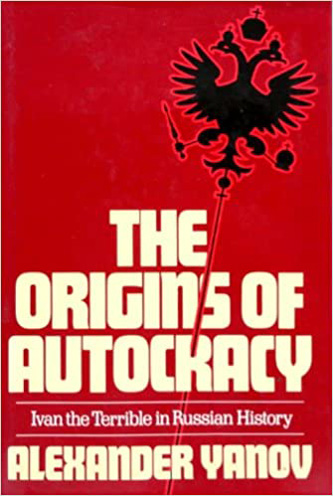
The author’s thesis is that Muscovy was Europeanizing until the mid-1500s. It had a choice in foreign policy of pushing back the Tatars or pushing back the Germans. Ivan the Terrible chose the Livonian War, pushing back the Germans, and rejecting Europeanization. The author writes: “[A new political structure, autocracy], unheard of in European history, was called forth by Ivan the Terrible’s Oprichnina revolution [of 1564–1584]. Ivan the Terrible and the origins of the modern Russian political structure were thus indissolubly connected.” The Oprichniki were Ivan’s monastic secret police, storm troopers, and political cadre.
Yanov, Alexander. The Russian New Right: Right-Wing Ideologies in the Contemporary USSR. Translated by Stephen P. Dunn. Institute of International Studies, University of California, 1978. [Yanov’s name is sometimes transliterated as Aleksandr Ianov.]
This political and historical analysis predicts what turned out to be Vladimir Putin’s ultranationalist ruling post-Communist ideology and anticipates as well the difficulties that would be faced by proponents of classical-liberal values in the era after Brezhnev. Richard Löwenthal writes in the foreword: “Yanov argues that the neo-Stalinist forces [in the USSR] will not be able to mobilize the masses for a return to a policy of austerity and sacrifice with the outworn formulas of Marxist-Leninist doctrine, but only by appealing to the nationalist and indeed chauvinistic belief in the greatness and unique mission of Russia, linked to the rejection of the influence of the ‘decadent West’ and its Jewish ‘microbes.’”
Yanov said that there existed in the USSR proponents of ‘gradual Europeanization,’ but pointed out that they had been defeated multiple times over the previous fifteen generations in Russian history. Peter J. S. Duncan calls this work one of “the most important secondary sources on Russian nationalism under Brezhnev.”
Young, Cathy. “Medieval Geopolitics Help Explain Modern Russia and Ukraine.” Reason magazine 54, no. 3 (July 2022): 10–11.
The author writes: “[T]he history of Russia and Ukraine goes all the way back to the Middle Ages. It raises fascinating questions about the role that different visions of liberty and the state played in their development. ...
“The events of 2022 can be seen as another chapter in a very long story: Ukraine looking westward and seeking freedom while Russia slides deeper into autocracy.”
Yovanovitch, Marie. Lessons from the Edge: A Memoir. Mariner Books, 2022.
Marie Yovanovitch was the U.S. Ambassador to Ukraine from 2016 to 2019. Before that, as a career Foreign Service officer, she had spent time in Somalia, Russia, Ukraine, Kyrgyzstan, Armenia, and once before in Ukraine. She finds that many a self-proclaimed reformer in foreign countries turns out on attaining office to be someone who blocks reform. The author’s rhetoric falls on the idealist side of the idealism-realism split that Robert E. Osgood delineated in U.S. foreign relations. She characterizes the approach of those American policymakers she disagrees with as “amoral.” She supports “democracy promotion.”
Yovanovitch has views that you might well expect. She wants “comprehensive” economic regulation of companies and private property in formerly Communist countries. She blames the unleashing of privatization and commerce and the abolition of price controls for “exploitation” of the people in those countries. When looking at a state-owned natural gas enterprise in Ukraine, she favors breaking it up into smaller state enterprises rather than privatization. She pushes for nationalization of a large bank in Ukraine. When it comes to privatization in Russia, she speaks of “the people’s wealth” and the alternative of the “long-term benefits” of “well-managed government control.”
When it comes to practical foreign policy Yovanovitch sees the U.S. government as necessarily the “pivotal” decisionmaker in the world. An unspoken assumption in the book is the wisdom of NATO expansion to encompass Ukraine. She criticizes a Ukrainian President for his “indecisiveness” about getting closer to NATO. The U.S., Yovanovitch says, wanted to turn Ukraine into a “proving ground” where “Western values, strategy, and technology” would “prevail” against Russia. U.S. policymakers, according to Yovanovitch, rejected the idea of a Russian sphere of influence on its borders and wanted a “Western-oriented Ukraine” to be Europe’s frontline in a possible future war with Russia. In describing the Maidan revolution of 2014 in Ukraine, she shows how she can combine U.S. strategic preferences with moralistic rhetoric when she posits that the pro-Europeans represent “the people’s will.”
As Ambassador, Yovanovitch gets caught in a turf war between two rivalrous teams of prosecutors in Ukraine—each of whom claims to be fighting corruption, but both of whom are talking rather than acting. The U.S. does quite a bit of micromanaging the Ukrainian legal system. Joe Biden demands that a prosecutor be fired; Yovanovitch demands that still another prosecutor be fired. In the end, Yovanovitch becomes a target of Rudy Giuliani’s machinations to get dirt in Ukraine on Joe Biden. She testifies about these machinations at Donald Trump’s first impeachment trial.

